
Публикация является частью публикации:
OF ITS
KIND
THE ENGLISH PRONUNCIATION AND SPEECH TRAINING MANUAL Get Rid of your
Tried and trusted method used in London drama schools
Get Rid of your Accent
THE ENGLISH PRONUNCIATION AND
"Precise, concise, compe//ing, comprehensive, achieving
its targets, witty, we// written and beautifu//y spoken, this book is a must
for every student, every actor and every individua/ aiming for a better living
and a better life in Britain and elsewhere.![]()
John Kennedy Melling, Fellow of the Institute of Chartered Accountants, Fellow of the Royal Society of Art, author, broadcaster and critic.
![]() "This
is a fabulous book! I'm a management accountant, but because ofn strong Polish
accent, I sometimes fet that people were treating me like t/ kebab woman. Now,
I listen to the CDs and practice and can see my progress; the method and
exercises in the book are rea//y working for me. Anna Tunc, UK immigrant from
Poland
"This
is a fabulous book! I'm a management accountant, but because ofn strong Polish
accent, I sometimes fet that people were treating me like t/ kebab woman. Now,
I listen to the CDs and practice and can see my progress; the method and
exercises in the book are rea//y working for me. Anna Tunc, UK immigrant from
Poland
"C/ear/y, the
authors of the book have co//ected years of experience and expertise to create
this practical and effective too/ for speech study. ![]() Joe Windley, Head of
Speech, Central School of Speech and Drama, Lond(
Joe Windley, Head of
Speech, Central School of Speech and Drama, Lond(
"The book has proved inva/uab/e in one to one teaching, a//owing me to focus on the student's prob/em areas. I hare also used it with success in a group environment. There is sufficient material to provide meaningfu/ practice of each sound with enough variety to keep students entertained. "
Marianne Gibson, teacher, St. George International College, London
"This is by far the best pronunciation book I have ever had and, be/ievc you me, I have bought and used numerous of them. The main author is evidently an expert in teaching pronunciation. The recorded exercises are exce//ent, too. I high/y recommend this book! I am very glad that I came across it!"
JV Barrios Nunez , Berkshire, England, Amazon.co.uk reader
Published by Business & Technical Communication Services Limited
8 Fairholme Road, London, W14 9JX
Information on this title: www.batcs.co.uk
(O Business & Technical Communication Services Limited, 2007
This book is in copyright. Subject to statutory exception and to the provisions of relevant collective licensing agreements, no reproduction of any part may take place without the written permission of Business and Technical Communication Services Ltd.
Third Edition
Printed in Hong Kong at Prosperous Offset International Ltd
Suite 2002 - 2003, Technology Plaza
651 King's Road, North Point, Hong Kong
![]()
![]()
ii


![]()
 Table of Contents
Table of Contents
Introduction
Method of learning ....
 The Phonemic Alphabet
The Phonemic Alphabet
The
Long vowels (5)
Lesson I: The [a:] sound as in
"car" ..............................![]() . 12
. 12
Lesson 2: The [u:] sound as in "beauty".. . 14 Lesson 3: The sound as in "horse" . 16 Lesson 4: The [i:] sound as in "feet". 18
Lesson 5: The sound as in 'Third".. .20
Short vowels (7)
Lesson 6: The [a] neutral vowel
(schwa) as in "banana"![]() .22
.22
Lesson 7: The 111 sound as in "pit"...26 Lesson 8: Comparison [a] - [l] and [1] - [i ] .28 Lesson 9: The [A] sound as in "duck"... .32
Lesson 10: The [o] sound as in
"box"...................... . .![]() .36
.36
Lesson Il: Comparison [D] - and [D) - [A] .38 Lesson 12: The [e] sound as in "pen".. .40 Lesson 13: The [u] sound as in "book". .42
Lesson 14: Comparison [u] and ... Lesson 15: The [æ] sound as in "cat"
Diphthongs (8)
Lesson 16: Diphthong IOU] as in ![]() 50
50
Lesson 17: Diphthong [el] as in
"cake" ................................![]() .52
.52
![]() Lesson 18: Diphthong 61] as in "boy"..54 Lesson
19: Diphthong as in "dear". .56
Lesson 18: Diphthong 61] as in "boy"..54 Lesson
19: Diphthong as in "dear". .56
Lesson 20: Diphthong [al] as in "bride" . .58
Lesson 21: Diphthong [oa] as in "poor" and triphthong [joa] as in
. .. 60
Lesson 22: Diphthong [eal as in "care".. .62 Lesson 23: Diphthong as in "cow" ... .64
Semi-Vowels (2)
![]() Lesson 24: Semi-vowel [j] as in
"yacht"..................................... . . 66 Lesson 25:
Semi-vowel [w] as in "want".....68
Lesson 24: Semi-vowel [j] as in
"yacht"..................................... . . 66 Lesson 25:
Semi-vowel [w] as in "want".....68
Plosive Consonants (6)
Lesson 26: Plosive consonants unvoiced [p] as in
"pack" and voiced [b] as in "big".![]() . 72 Lesson 27: Plosive
consonants unvoiced [t] as in "tent" and voiced [d] as in
"dog".
. 72 Lesson 27: Plosive
consonants unvoiced [t] as in "tent" and voiced [d] as in
"dog".![]() . 78 Lesson 28: Plosive consonants
unvoiced [k] as in "kind" and voiced [g] as in "gloss"
..... .... ..... ..
. 78 Lesson 28: Plosive consonants
unvoiced [k] as in "kind" and voiced [g] as in "gloss"
..... .... ..... ..![]() .82
.82
Nasal Consonants (3) and Nasal Plosions (2)
Lesson 29: Nasal consonant [m] as in
"monk"...![]() . 86 Lesson 30: Nasal consonants [n] as in
"nun"
. 86 Lesson 30: Nasal consonants [n] as in
"nun"![]() . 90
. 90
Lesson 31: Nasal consonants [O]
as in "king".![]() . 92
. 92
Lesson 32: Nasal plosions [till] as in "cotton" and [dill] as in
![]() .94
.94
Lateral Consonants (1) and Lateral Plosions (2)
Lesson 33: Lateral consonant [I]
as in "London" ![]() 98
98
Lesson 34: Lateral plosions [tll] as in "little" and [dll] as in
"candle" .![]() . 100
. 100
Fricative consonants (10)
![]() Lesson
35: Fricative consonants unvoiced [f] as in "fun" and voiced [v] as
in "value". 102 Lesson 36: Unvoiced consonant [9] as in
"think" ... . 106 Lesson 37: Voiced consonant [ò] as in .. ..
. 108
Lesson
35: Fricative consonants unvoiced [f] as in "fun" and voiced [v] as
in "value". 102 Lesson 36: Unvoiced consonant [9] as in
"think" ... . 106 Lesson 37: Voiced consonant [ò] as in .. ..
. 108
Lesson 38: Unvoiced [s] as in "son" and voiced [z] as in "zigzag" . 110 Lesson 39: Unvoiced [J] as in "shock" and voiced [5] as in
"vision". 114
![]() Lesson 40: Unvoiced
consonant [h] as in "hat" .... 118
Lesson 40: Unvoiced
consonant [h] as in "hat" .... 118
Affricates (2)
Lesson
41: The [r] sound as in ![]() 120 Lesson 42: Affricates unvoiced [tJ]
as in "church" and voiced [d5] as in "gin"
120 Lesson 42: Affricates unvoiced [tJ]
as in "church" and voiced [d5] as in "gin"![]() . 122
. 122
Conclusion....................... .
126 ![]()
Maintaining correct pronunciation .... ..... ..... ..... ...... . 127 Warm-up exercises................................. . 129
Difficulties in pronunciation of the speakers of world languages..... 133
Bibliography![]() . 137
. 137
CD Contents .............................................................................. 138
![]() Glossary. 140 Acknowledgements............................. .
142
Glossary. 140 Acknowledgements............................. .
142 ![]()
![]()
![]() ii
ii
What is an accent?
An accent identifies which part of the country or world you come from. There are different types of accents: Scottish, Russian, Spanish, educated, strong, slight and many others.
According to the latest edition of the Rough Guide to England, "England is a country where accent and vocabulary can stamp a person's identity like a brand." Indeed, the biggest single factor that affects people's first impression of you is your speech and accent.
Why do we speak with different accents?
From our childhood we learn to speak by imitating our relatives, teachers and friends. The way we speak and our pronunciation are influenced by the environment we live in.
Sounds are created by our speech organs, namely lips, tongue and jaw. Positions of our speech organs are different for different sounds. For example, we drop the tongue in order to pronounce the English [æl sound as in "cat". In order to pronounce [WI as in "way" we put our lips in a tight whistle.
Many people begin to learn English when they are adults. They may not automatically position their speech organs as native English speakers will. Moreover, they often dont know how to correctly position their speech organs in order to produce clear English sounds because not all English sounds exist in other languages.
For example, there is no [w] in Russian, and many Russians pronounce [v] instead of [w]. Another example is that in Russian they don't have long vowels, and therefore there is a natural tendency for Russians to shorten long English vowels and diphthongs. Instead of "two sheets of paper" they most likely will pronounce "two shits of paper". Instead of saying "the room is dark", they are likely to pronounce "the room is duck".
Speaking, writing and listening are taught in most colleges, but phonetics and pronunciation classes are not always part of the
1
curriculum, and even when they are, they tend to be very basic and focusing more on conversation than phonetics.
Is it important to have good pronunciation?
Just consider the following points:
Bad pronunciation:
• May be confusing and hard to understand for those who listen to you
• Gives the impression that you are uneducated
• Doesnt allow you to become a good public speaker.
Good pronunciation and a neutral accent:
• Allows you to become a pleasant communicator
• Is a good basis for public speaking
• Will enable you to enjoy speaking more
• Gives you confidence, and your confidence in turn opens up for you all sorts of opportunities.
Is it possible to reduce or eliminate an accent?
The earlier we start to pronounce English properly, the less accent we have. It's more difficult to reduce or completely eliminate an accent when you are older. However, it is not impossible. It all depends on your hard work, perseverance, high quality professional training, and — last, but not least — on using the appropriate book with a sound track.
Why Received Pronunciation?
Why not learn to speak with a
Scottish or London Cockney accent? Why make an effort to reduce a strong
Russian or Spanish accent? The![]()
reason is very simple: to help you with making your English clear and easy to understand for the majority of English-speaking people.
This book teaches you how to develop Received Pronunciation (RP). RP is simply a neutral pronunciation of educated Southern English. It's sometimes called Standard English.
2 ![]()
![]()
![]()
![]() Beginning over a
century ago, RP spread rapidly throughout the Civil Service of the British
Empire and became the voice of authority and power in a substantial part of the
world. Because it was a regionally 'neutral' accent, and was thought to be more
widely understood than any regional accent, it also came to be adopted by the
BBC when radio broadcasting began in the 1920s.
Beginning over a
century ago, RP spread rapidly throughout the Civil Service of the British
Empire and became the voice of authority and power in a substantial part of the
world. Because it was a regionally 'neutral' accent, and was thought to be more
widely understood than any regional accent, it also came to be adopted by the
BBC when radio broadcasting began in the 1920s.
The first Director General of the BBC, Lord Reith, when asked why he had chosen RP for the BBC, replied: "I tried to get a style or quality of English which would not be laughed at in any part of the country."
To date RP retains its considerable status. It is still the standard accent of Parliament, the Church of England, the High Courts and other British national institutions. It has long been the chief accent taught to foreigners who wish to learn a British model. RP is also taught in acting schools in the UK, as actors from different cultural and social backgrounds are required to have the ability to speak using RP when it's necessary for their performances.
It should be noted that RP is not static. Modern RP has been simplified compared to, say, what it was over 50 years ago, and now sounds more neutral and democratic. However, it will most certainly remain the accent of educated people.
Why we wrote this book
To date you can only get speech training in British drama schools or if you take speech lessons from a private speech tutor. We wanted to make this exclusive training accessible for a much wider audience. We took the method long used in London drama schools, adapted it for learners of English and collated it into a single training manual, the first of its kind.
You will find that you will get from the book what you
put into your ![]() work with it. The exercises are quite
intensive and will require you to work hard at your pronunciation. But, the
book isn't just a study tool; we have also tried to make it amusing and
interesting. Have fun, and remember that your hard work will be rewarded in
full!
work with it. The exercises are quite
intensive and will require you to work hard at your pronunciation. But, the
book isn't just a study tool; we have also tried to make it amusing and
interesting. Have fun, and remember that your hard work will be rewarded in
full!
3
Three things that make our book special
• Tried and trusted method in eliminating an accent
• Fun yet very effective speech training
![]() • Amusing vocabulary
• Amusing vocabulary
Methodology used in this book
In our book, we set out a complete method of learning English sounds, which somebody who comes from a different country might not have in their own native language.
One of the important things about our book is that we make it absolutely clear what is happening in the mouth: where the lips go, where the tongue is placed, if the jaw is open or closed, etc. Once those three positions are checked and sorted out then there is no way that you could not make that particular English sound.
The second important part of speech training is training the muscles of the tongue, lips and jaw, so that the brain memory responds to it automatically. You train them by pronouncing words and sentences with a target sound. You finish with a little bit of verse, something interesting and amusing, but also containing a target sound.
For consonants we also give practice through articulation exercises, such as period verses and tongue-twisters, which get the tongue and the lips really moving so that we get clarity and crispness of speech. English is a very energetic and dynamic language and good articulation makes a big difference.
Exercises in the book are accompanied by a sound track on the CD. Students should listen to the CD, practice the correct sound throughout and then record themselves and listen to the recording in order to see their progress. We also encourage students to use the correct sounds in their everyday speech and support it by additional exercises at the end of each lesson.
The CD was recorded by professional actors who used drama techniques in order to make the sentences, verses and poems sound interesting and amusing. This also helps you to imagine what you are reading and that will help you to memorise sounds.
4
![]()
![]()
![]() The lessons in this
book are quite intensive and are aimed for those who strive to achieve
outstanding results in improving their accents within a short period of time.
Your results might depend on your ability to hear your own speech and the time
you spend mastering the sounds.
The lessons in this
book are quite intensive and are aimed for those who strive to achieve
outstanding results in improving their accents within a short period of time.
Your results might depend on your ability to hear your own speech and the time
you spend mastering the sounds.
At the end of the book we also provide students with instructions and advice on how to maintain correct pronunciation. In support of that we give a warm-up exercise for all the English sounds (see page 129).
Students will also find a table of particular difficulties with the English pronunciation which speakers of other world languages have (see page 132).
English spelling and pronunciation
In many languages letters of the alphabet are pronounced in the same way as they are spelled. However, the English language was, at different times, under French, German and Dutch influence. English inherited and includes many foreign words. This is one of the reasons why there are so many exceptions to the rule in pronunciation and spelling.
The characteristic peculiarity of the English language is that the same letter of the alphabet can be pronounced differently. For example, the letter "a" in the word "father" is pronounced as a long vowel [a:l, but in the word "man" it is a short vowel sound In the word "among", where it's not stressed, it is a neutral vowel or schwa Thus the letter "a" can be pronounced in at least three different ways.
Another difficulty is that the same English sounds have different spellings. For example, diphthong [10] has several spellings: in the word 'fear' it is spelled as 'ear', in the word 'weird' it is spelled as 'eir'.
Although we highlight the practiced sound in bold and offer different spelling variations for the same sound, we should point out that there can be other spelling variations for the same sound. Therefore, when you learn a new word you should always consult a dictionary for the correct phonetic pronunciation.
5
Who this book is for
The book enables people to develop clear and precise English speech, and to neutralise their foreign or their British regional accent. Both native and non-native English speakers will benefit from the book.
Native English speakers include:
• Pronunciation and speech teachers
• Actors with non-RP accents who wish to pursue an acting career in the UK
• Hollywood actors who need to develop a British accent
• Professionals for whom a high standard of English and clarity of speech are important.
Non-native English speakers include:
• Students
• International businessmen and executives
![]() Diplomats
Diplomats
•
Call centre employees ![]() Intelligence agents
Intelligence agents
![]()
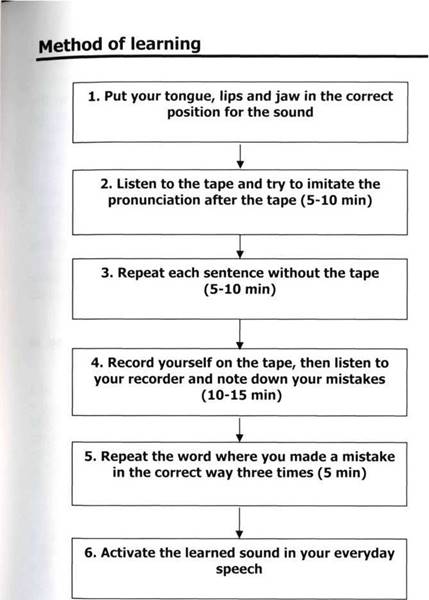
• People who work in service and hospitality industries and need to communicate with good English.
6 7
What is needed to start working with the book?
• a mirror, to compare the shape of your own mouth to the shape of the mouth that you will find in diagrams at the beginning of each lesson;
• a tape recorder, to record your practices;
• a CD player.
See page 11 for a labelled diagram of speech organs.
How many hours you should spend on each sound:
• Practice each sound for about 20-40 minutes a day, with little breaks in between;
• Repeat on the following days for approximately the same length of time until you feel that you can use the correct sound in your everyday speech.
As shown on the previous page the method of learning is based on a six-stage process:
The first stage is to make sure that you put your lips, tongue and jaw in the right position for the learned sound. If you fail to do so, the sound will not be precise and may be different altogether. Follow the instructions on speech organ position given at the beginning of each lesson. Pronounce the sound several times looking in the mirror to make sure you do it correctly. When you feel that your sound is correct, start pronouncing the words, sentences and verses in the lesson.
The second stage is aimed at helping you learn a sound by repeating and imitating after the tape. This exercise will help you to make the sound as correctly as possible and train your speech organs for the particular sound. The more you repeat after the tape, the better your pronunciation becomes.
The third stage gives you an opportunity to practice the sound on your own, without the help of the tape. You will be hearing yourself and mastering the sound. This stage is essential before recording yourself.
8
The fourth stage involves recording yourself and listening to the recording. It helps you to see whether you have progressed in mastering the pronunciation and to identify where you still make mistakes.
The fifth stage focuses on eliminating mistakes. Correctly repeating the words where you made a mistake will help you avoid repeating the same mistakes in the future.
The sixth stage has the purpose of helping you incorporate the learned sound in everyday speech. It's about trying to find the learned sound in the newspapers, on the radio, on TV and in English language videos. Pay attention to how you pronounce the learned sound in your everyday speech. This will help you to activate the correctly pronounced sounds.
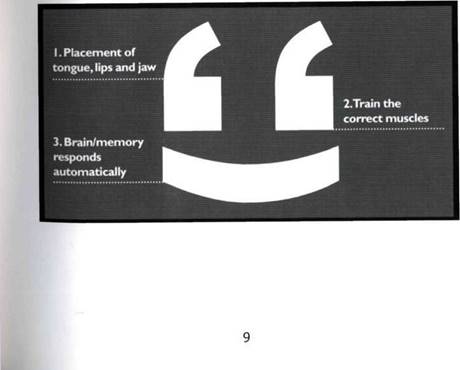
|
The Phonemic Alphabet |
The Speech Organs |
|
|
car |
box |
la fear |
cake |
|
it |
birth |
horse |
duel |
|
|
|
banana |
book |
chair |
ie |
|
cat |
duck |
|
cow |
snow |
|
ub |
bank |
kin |
host |
monk |
|
trick |
drink |
fish |
victo |
nun |
|
church |
|
sun |
zero |
son |
|
thi |
the |
shock |
resti e |
hat |
|
luck |
rock |
world |
acht |
|
 Vocal Chords
Vocal Chords
10 11

Listen and repeat. Look at the mouth diagram to help you position your lips, tongue and
copy the intonation and voice modulation on the CD.
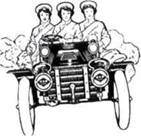 car
is a Jaguar drives rather fast.
car
is a Jaguar drives rather fast.
farms and draughty barns, charging past.
good friends, was called to the bar, appetite fresh and hearty, as many barristers are, impecunious party.
exercises:
down 4 words with the target sound that you often use when speaking
Practice these words, thinking about your lips, tongue andjaw positions for the target sound.
1. 3.
![]()
2. 4.
![]()
B: Write down 4 words with the target sound that you often hear on W, radio or from your friends/co//eagues. Practice these words, thinking about your lips, tongue andjaw positions for the target sound.
1. 3.
|
|
A3 9 Verses and Barbara's And Barbara Castles, She goes When I, I'd an But I was, An Additional A.• Write English. |
2.4.
13
jaw for the target sound.
![]() Spelling variations for the sound ar ("r" is
silent) ear, er, al, au a before s, n and th
Spelling variations for the sound ar ("r" is
silent) ear, er, al, au a before s, n and th
A2
O Sentences
Highlighted bold letters pronounced as![]()
|
Listen and repeat. Read each sentence aloud s/ow/y at first, then as ifyou were te//ing it to someone in a natura/ way. 1. 2. Let's park our car at Barbara's as
the car park is 3. At last Margaret's anxiety passed and she chanced a disastrous dance with a laughing sergeant. 4. I'd rather take a chance and let my father drive me to the garage in his fast car. 5. Hard-hearted Margaret was reading psalms in the dark. 6. As an office boy I made such a mark that I was given the post of a junior clerk, 12 |
![]() art, arms, bar, mark, arch, bark,
dark heart, sergeant, clerk, Derby, psalm, laugh bath, castle, fast, glass,
disaster, rather, enhance
art, arms, bar, mark, arch, bark,
dark heart, sergeant, clerk, Derby, psalm, laugh bath, castle, fast, glass,
disaster, rather, enhance

O Words
![]()
Listen and repeat. Look at the mouth diagram to help you position your lips, tongue and jaw for the target sound.
|
Spelling variations for the sound |
Highlighted bold letters pronounced as [u:] bloom, food, smooth, loop, school, doom lose, move, do, who, improvement, remove |
|
ue, oe |
blue, glue, shoes |
|
ui |
fruit, juice, cruise |
|
Spelling variations for the [ju:l sound |
Highlighted bold letters pronounced as [ju:] |
|
u |
tune, tube, music, curious, tulips |
new, few, Kew, mews
Sentences
Listen and repeat. Read each sentence aloud s/ow/y at first, then as ifyou were te//ing it to someone in a natural way.
I. Ruth felt in tune with the cool of a June evening and admired the beauty of the moon.
2. There are quite a few music super-stars on the London tube,
3. These new blue shoes look beautiful with a navy blue coat.
4. On
our cruise to Bermuda we played snooker with our schooner cr![]()
5. Coolies are made from juicy fruits and sugar.
14
6. ![]()
![]() The music tutor sang a tune on
Tuesday for the duke. 7. A few beautiful tulips grew in the school garden in
July.
The music tutor sang a tune on
Tuesday for the duke. 7. A few beautiful tulips grew in the school garden in
July.
A6
9 Verses
Listen and copy the intonation and voice modulation on the CD.
I'd a swallow-tail coat of beautiful blueA brief which I bought off a booby
A couple of shirts and a collar or two, And a ring that looked like a ruby!
 We sail the ocean
blue,
We sail the ocean
blue,
And our saucy ship's a beauty; We're sober men and true,
And attentive to our beauty.
Additional exercises:
A.• Write down 4 words with the target sound that you often use when speaking English. Practice these words, thinking about your lips, tongue andjaw positions for the target sound.
1.
![]() 3.
3. ![]()
2. 4.
![]()
B: Write down 4 words with the target sound that you often hear on TV, radio or from your friends/co//eagues. Practice these words, thinking about your lips, tongue andjaw msitions for the target sound.
1. 3.
![]()
2. 4.
![]()
15
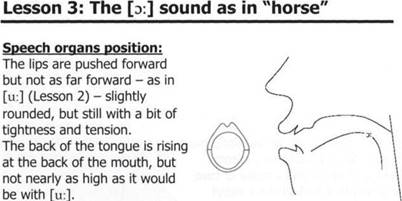
![]()
O Words
|
|
Highlighted
bold letters pronounced as |
|
or |
storm, door, horse, corpulent, sordid, organic |
|
aw |
awe, law, dawn, lawn, sprawl |
|
au |
caustic, Paul, cautious |
|
augh |
naughty, haughty, daughter |
|
a before I and al |
almost, ball, wall, walk, talk, appalling, |
![]() Listen and repeat. Look at the mouth
diagram to help you msition your lips, tongue and
Listen and repeat. Look at the mouth
diagram to help you msition your lips, tongue and ![]() jaw for the target sound.
jaw for the target sound.
although
A8
O Sentences
6. Paul called out when he thought he saw his naughty daughter fall in the water.
Verses
![]()
![]() Listen and copy the intonation and
voice mcMu/ation on the CD.
Listen and copy the intonation and
voice mcMu/ation on the CD.
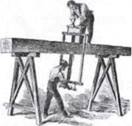 AS I was going by Mr
King's yard,
AS I was going by Mr
King's yard,
I saw a man sawing,
And of all the sawyers I ever saw, I never saw a saw saw like that saw sawed.
Additional exercises:
A: Write down 4 words with the target sound that you often use when
speaking English. Practice these words, thinking about your lips, tongue andjaw
positions for the ![]() target sound.
target sound.
1.
![]() 3.
3. ![]()
2. 4.
![]()
B: Write down 4 words with the target sound that you often hear on TV, radio or from your friends/co//eagues. Practice these words, thinking about your lips, tongue andjaw msitions for the target sound.
1. 3.
![]()
|
1. George was falling asleep awkwardly in a sprawl. 2. The written laws ought to prevent thoughtless talks. 3. This appalling store was full of all sorts of ordinary shorts. 4. Maud's daughter Georgina was an awful daughter-in-law. 5. Four hundred and forty-four storks flying home in the storm. 16 |
2. 4.
![]()
"feet"
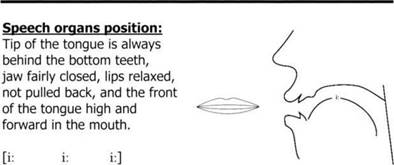
O Words
Listen and repeat. Look at the mouth diagram to he/p you position your lips, tongue and jaw for the target sound.
![]()
![]()
![]()
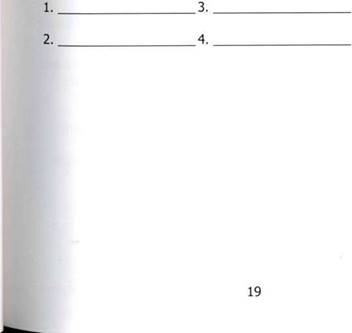
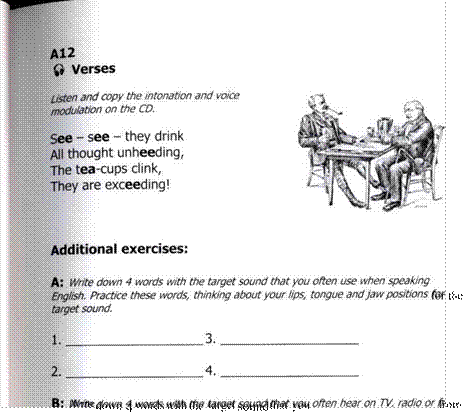
![]() Spelling variations Highlighted bold
letters pronounced as
Spelling variations Highlighted bold
letters pronounced as ![]() for the sound keel, feeble, seek, heed, see, peep, feel he, evening, eve,
demonise, Peter, these meat, tea, leave, jeans, please, team
for the sound keel, feeble, seek, heed, see, peep, feel he, evening, eve,
demonise, Peter, these meat, tea, leave, jeans, please, team
|
ie |
grief, field, relief, believe |
|
ei |
receipt, deceit, seize |
G Sentences
Verses
LjW7 and copy the intonation and voice muu/ation on the CD.
see — they drink thought unheeding, tea-cups clink, are exceeding!
Additional exercises:
A.• Write down 4 words with the target sound that you often use when speaking target sound.
3.
|
Listen and
repeat. Read each sentence aloud s/ow/y at first, then as ifyou were te//ing
it 1. One evening, lying by the stream on the green grass, I dreamed of eating sweets. 2. Jean, have you been in a wheat field in Leek? 3. His demeanour seems to reveal the secret reasons for his deceit. 4. Demonised teenagers were pleased with their tea. 5. All legal furies seize you! No proposal seems to please you. 6. I believe my feet are really quite clean, Evie.
|
your friends/co//eagues. Practice these words, thinking about your lips, tongue andjaw positions for the target sound,

Listen and repeat. Look at the mouth diagram to help you position your lips, tongue and jaw for the target sound.
Spelling variations Highlighted bold letters pronounced as ![]() for the [3:1 sound
for the [3:1 sound
|
|
perjury, commercial, were, verse, infernal |
|
ir |
shirt, first, stir, girl, Sir, bird |
|
ear |
yearn, earn, pearl |
|
ur |
urge, occur, murmuring, burden, furnace, burn work, worse, world, word |
A14
O Sentences
Listen and repeat. Read each sentence aloud s/ow/y at first, then as ifyou were telling it to someone in a natural way.
I. The girls in purple shirts were urged not to disturb Sir Cuthbert.
2. This purple shirt is the worst in the world! I have no words!
3. We were working in the World Bank at first; then we were transferred to the Commercial Chambers in Perth.
4. My boyfriend is a perfect nerd who makes his earnings when everyone else is yawning.
5. The girl heard that she came third in the World Championships as a hurdler.
6. Ursula observed that the boy wore a dirty purple jersey.
20
A15
9 Verses
Lßten and copy the intonation and voice modulation on the CD.
 When I was a lad I
served a term
When I was a lad I
served a term
![]()
![]() As office
boy to an Attorney's firm.
As office
boy to an Attorney's firm.
The rich attorney was good as his word; And every day my voice was heard At the Sessions or Ancient Bailey.
Additional exercises:
A.• Write down 4 words with the target sound that you often use when speaking English. Practice these words, thinking about your lips, tongue andjaw positions for the target sound,
1. 3.
![]()
2. 4.
![]()
B• Write down 4 words with the target sound that you
often hear on TV, radio or from your friends/co//eagues. Practice these words,
thinking about your lips, tongue andjaw ![]() for the target sound.
for the target sound.
1.
![]() 3.
3. ![]()
2. 4.
![]()
21
![]()
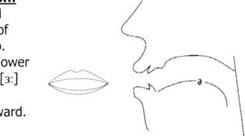 Speech organs
position: Jaw is half open, relaxed tongue and lips. Middle of the tongue
is halfway up. Tongue position is a bit lower than when pronouncing
Speech organs
position: Jaw is half open, relaxed tongue and lips. Middle of the tongue
is halfway up. Tongue position is a bit lower than when pronouncing
(Lesson 5).
Tongue is not going forward. The sound is very short.
A16
O Words
Listen and repeat. Look at the mouth diagram to help you position your lips, tongue and jaw for the target sound.
Highlighted bold letters pronounced as [a] The first syllable away, agree, abuse, aboard, against, advice, unstressed
attain,
advance, canal, correct, police, support ![]()
The second syllable doctor, under, figure, colour, absent, constant, unstressed
standard, oral, forward, upward, awkward
A17
Unstressed positions
and an
![]() Fish and chips Get a spoon Have
an apple
Fish and chips Get a spoon Have
an apple
Salt and pepper Cut a piece A question and an answer
Pork and beans Here's a plate An aunt and an uncle Ladies and Lend a hand Listen to an announcement gentlemen
MB: Schwa is the most-used sound in English. Very often, unstressed sy//ab/es and words in a sentence are pronounced with a schwa.
22
|
A18
A19 9 to 1.
2. Is 3.
|
4.
![]()
![]()
![]() 5.
5.
6.
7.
Comparison: [a] and![]()
slogan girl forward word awkward third
standard earn upward ![]() backward work
backward work
Sentences
and repeat. Read each sentence aloud s/ow/y at first, then as ifyou were te//ing it ømeone in natura/ way.
 What are you doing in
London? We are looking a hairdresser.
What are you doing in
London? We are looking a hairdresser.
it made of glass? No, it's made of plastic.
What can I do? What has she done? What have done?
She had done it before she came here.
Amanda, phone call for you!
The conductor of the orchestra was amazed to see the viola player drink a scotch and soda. Tell my sister Amanda to buy some better bananas as well as potatoes and tomatoes.
23
A20
O Comparison: stressed and unstressed vowel position
Stressed position Unstressed position, pronounced with tal What are you looking at? [æJ Look at him.
What is it made of? [D] It's made of cotton.
Where do you come from?![]() I
come from Paris.
I
come from Paris.
Who is it for? It's for you.
Wouldn't you agree? (u] I would say yes.
Weren't you there?![]() We were absent.
We were absent.
Wasnt he there? [D] Yes, he was sitting next to me.
A21
![]()
![]()
![]()
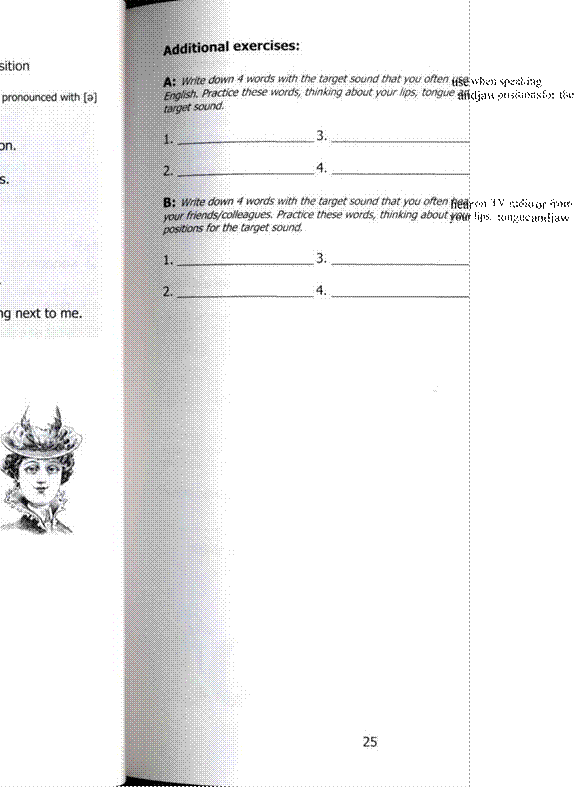 O Verses
O Verses
Listen and copy the intonation and voice modulation on the
My jealousy I cant express,
Their love they openly confess; Her shell-like ears she does not close To their recital of their woes.
24
Speech organs position: The front of the tongue comes high in the front of the mouth, not quite as high as the long [i:] sound (Lesson 4) and just a fraction back.
![]() i: i:]
i: i:]
A22
O Words
Verses
and copy the intonation and voice modulation on the CD.
Here's a first—rate opportunity
To get married with impunity,
To indulge in the felicity unbounded domesticity.
You shall quickly be personified,
Conjugally matrimonified, By a doctor of divinity,
Who resides in this vicinity.
![]()
![]()
![]() Listen and repeat. Look at the mouth
diagram to help you position your lips, tongue and Additional exercises: jaw
for the target sound.
Listen and repeat. Look at the mouth
diagram to help you position your lips, tongue and Additional exercises: jaw
for the target sound.
 for the
[11 sound target sound. him, hilarious, hideous, hint, whim, vision,
spirit village, cabbage 3. e delete, defeat, delusion crypt, synonym,
symbol, symptoms, hymn 2.
for the
[11 sound target sound. him, hilarious, hideous, hint, whim, vision,
spirit village, cabbage 3. e delete, defeat, delusion crypt, synonym,
symbol, symptoms, hymn 2.
B: Write down 4 words with the target sound that you
often hear on TV, radio or from A23 your friends/co//eagues.
Practice these words, thinking about your lips, tongue andjaw G Sentences ![]() positions for the target sound.
positions for the target sound.
Listen and repeat. Read each sentence
aloud s/ow/y at first, then as ifyou were telling it 1. ![]() 3.
3. ![]() to someone in a natural way.
to someone in a natural way.
2. 4.
![]()
I. Those lettuces taste like cabbages.
2. Bill lifted the lid of the bin tentatively and found not a single thing.
3. Tell Jill I think this is a silly little game.
4.
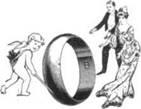 I can't stay a minute longer in this miserable little pit!
I can't stay a minute longer in this miserable little pit!
5. Tim Grim is a solid, respectable man and is a pillar of society.
6. This simple thing, a wedding ring, is a symbol, the oldest in history.
7. Climbing over a rocky mountain, skip the rivulet and the fountain.
26 27
Letter 'e' is pronounced as a schwa [a]
greasy relieve easy repeat
![]()
![]()
![]()
![]()
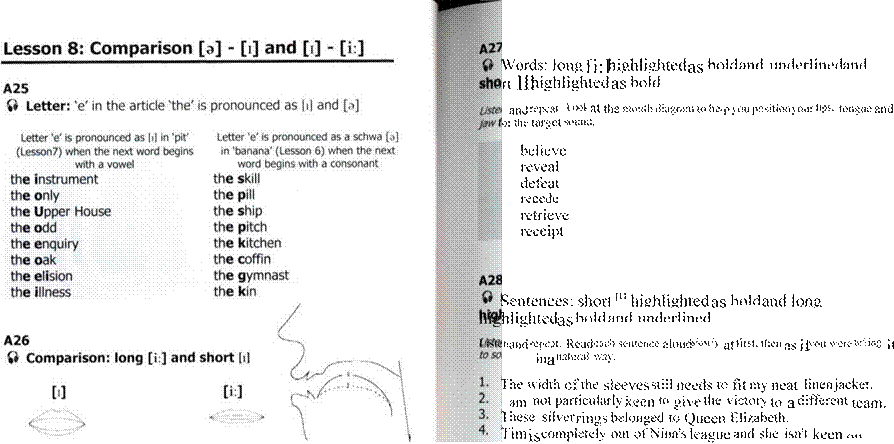
![]() the skill sneezing meeting
the pill thesis yielding the ship seeing seizing the pitch serene freezing
the kitchen the coffin the gymnast the kin
the skill sneezing meeting
the pill thesis yielding the ship seeing seizing the pitch serene freezing
the kitchen the coffin the gymnast the kin![]()
being chased by him.
5. There is a little something missing in this meal. Have you tried to add some dill?
 reason risen beast bit 6.
My next of kin, Mr. Bean, is a Dean of Leeds University. bin queen kin
ease is deal dill sleep slip need Nick A29
cheap chip leek lyric O Verses wheat wit people pitch
reason risen beast bit 6.
My next of kin, Mr. Bean, is a Dean of Leeds University. bin queen kin
ease is deal dill sleep slip need Nick A29
cheap chip leek lyric O Verses wheat wit people pitch
leap greed grid Listen
and copy the intonation and voice modulation on feet fit leave live the
CD. team Tim sneaky snip![]()
![]() He is an Englishman!
He is an Englishman!
For he himself has said it, And it's greatly to his credit, That he is an Englishman!
28 29
Additional exercises:
A: Write down 4 words with target that you often use when speaking English. Practice these words, thinking about your lips, tongue andjaw positions for the target sound.
1.
![]() 3.
3.
2.
![]() 4.
4.
B: Write down 4 words with the target sound that you often hear on TV, radio or from your friends/co//eagues. Practice these words, thinking about your lips, tongue andjaw
positions for the target sound.
1.
![]() 3.
3.
2.

![]()
3031
9: [A] as in "duck"
front duck bud punch stuck rough tough
A30
O Words
Listen and repeat. Look at the mouth diagram to help you position your lips, tongue and jaw for the target sound.
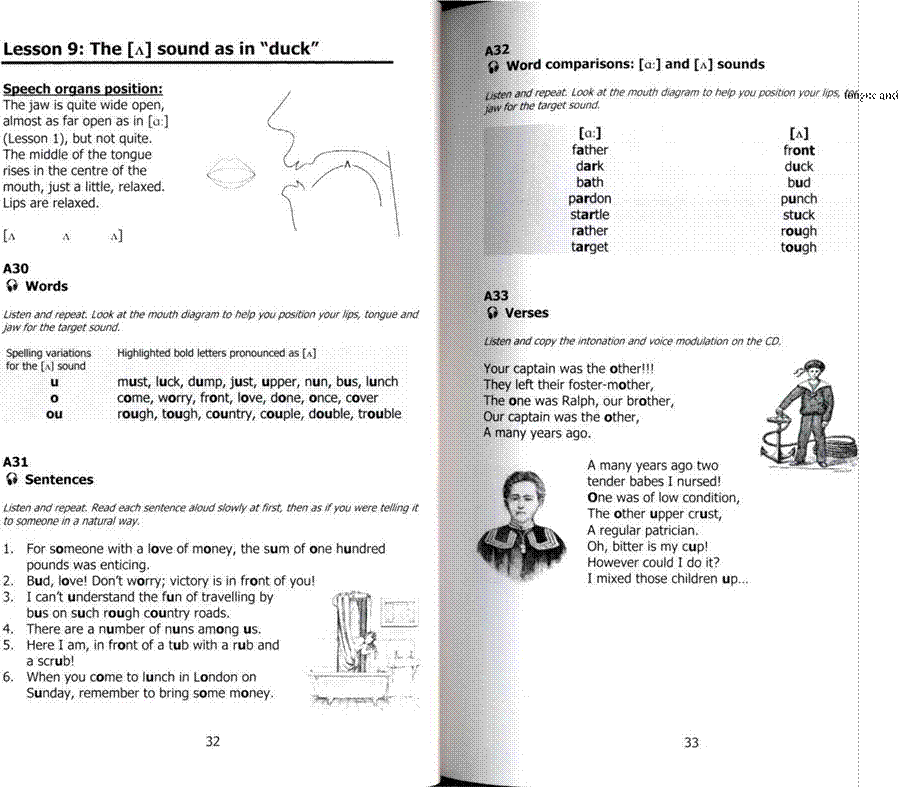 Spelling variations Highlighted bold
letters pronounced as [A] for the [Al sound must, luck, dump, just, upper, nun,
bus, lunch come, worry, front, love, done, once, cover ou rough, tough,
country, couple, double, trouble
Spelling variations Highlighted bold
letters pronounced as [A] for the [Al sound must, luck, dump, just, upper, nun,
bus, lunch come, worry, front, love, done, once, cover ou rough, tough,
country, couple, double, trouble
A31
O Sentences
Listen and repeat. Read each sentence aloud s/ow/y at first, then as ifyou were te//ing It to someone in a natural way.
I. For someone with a love of money, the sum of one hundred pounds was enticing.
2.
Bud, love! Don't worry; victory is in front of you!![]()
3. I can't understand the fun of travelling by bus on such rough country roads.
4. There are a number of nuns among us.
5. Here I am, in front of a tub with a rub and a scrub!
6. When you come to lunch in London on
Sunday, remember to bring some money.
Additional exercises:
A: Write down 4 words with target that you often use when speaking English. Practice these words, thinking about your lips, tongue andjaw positions for the target sound.
1. ![]()
2. 4.
![]()
B.• Write down 4 words with the target sound that you often hear on TV, radio or from your friends/co//eagues. Practice these words, thinking about your lips, tongue andjaw
positions for the target sound.
1.
![]() 3.
3. ![]()
2. 4.
![]()
34 35
fond, lock, stop, gone, odd, lost, sorry, wrong, often, clock, knock, obvious, promise, doctor want, was, wander, wallet, wallow, wash, watch, warrior, waffle, squat, quantity
A35
O Sentences
Listen and repeat. Read each sentence aloud s/ow/y at first, then as ifyou were telling it to someone in a natural way.
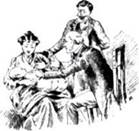 I.
A lot of odd documents in strong boxes are locked in the office.
I.
A lot of odd documents in strong boxes are locked in the office.
2. Can I wash my cotton socks in the long pond?
3. The doctor promised to watch Tommy's cough and after four days the cough had stopped.
4. Sorry, I've forgotten my wallet in the shop.
5. The conversation in the office was
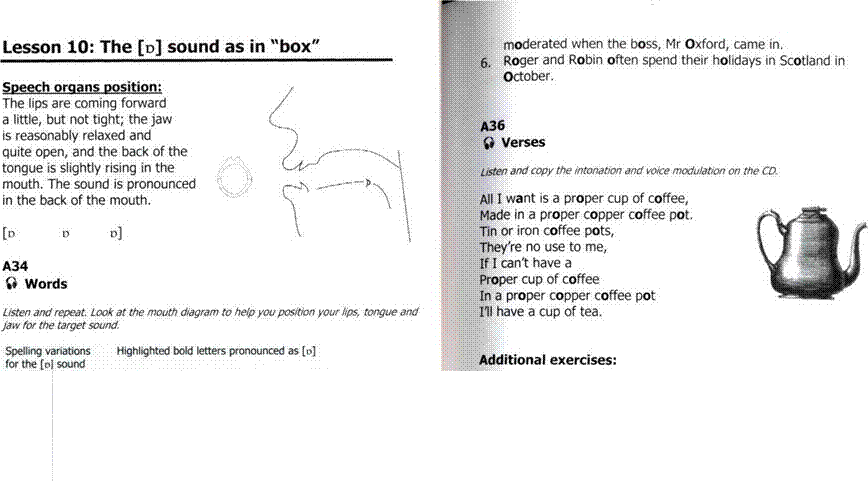 |
A: Write down 4 words with the target sound that you often use when speaking English. Practice these words, thinking about your lips, tongue andjaw positions for the target sound
1.
![]() 3.
3. ![]()
2. 4.
![]()
B: Write down 4 words with the target sound that you often hear on TV, radio or from your friends/co//eagues. Practice these words, thinking about your lips, tongue andjaw positions for the target sound,
1. 3.
![]()
2. 4.
![]()
37
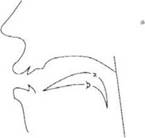 Comparison
[D] - [X] and [D] - [A]
Comparison
[D] - [X] and [D] - [A]![]()
![]()
![]() Sentences:
short [D] highlighted as bold and long highlighted as black and underlined
Sentences:
short [D] highlighted as bold and long highlighted as black and underlined
A37
![]()
 O Word comparisons: long to:] andand
repeat. Read each sentence aloud s/ow/y at first, then as ifyou were te//ing it
short [D]ømeone in a natural way.
O Word comparisons: long to:] andand
repeat. Read each sentence aloud s/ow/y at first, then as ifyou were te//ing it
short [D]ømeone in a natural way.
have a lot of long and short shirts. I have bgught these awesome chocolates from the store at the top of Chekhov Street in Decking.
Tom's naughty daughter ate all the lobsters and strawberries. position your lips, tongue and There was a glorious picture of Almighty God jaw Listen for and the repeat. target sound.Look at the mouth diagram to help you on the wall in the cottage.
Maud's mind was caught with horrible daunting thoughts.
daughter doll portion polish What a gorgeous golf course! Top notch! lawn lofty gorgeous gone 7. It doesn't bQte Tom to walk his dog in the law lobster stalk glorious autumn mgrning. morning mock naughty notch glorious glossy quarter quality ought office Additional exercises:
 door walk what
door walk what
A: Write down 4 words with the target sounds that you often use when speaking English. Practice these words, thinking about your lips, tongue andjaw positions for the target sound.
A38
![]() Listen and repeat. Look at the mouth
diagram to help you position your lips, tongue and
Listen and repeat. Look at the mouth
diagram to help you position your lips, tongue and
jaw for the target sound.
|
|
[DI |
|
|
buddy |
|
talk |
|
tough |
Chekhov |
daughter |
|
front |
comment |
orchestra |
|
rough |
economist |
glorious |
|
couple |
politicians 38 |
ordinary |
![]() B: Write down 4 words with the target
sounds that you often hear on TV, radio or from your friends/co//eagues
Practice these words, thinktng about your lips, tongue andjaw for the target
sound.
B: Write down 4 words with the target
sounds that you often hear on TV, radio or from your friends/co//eagues
Practice these words, thinktng about your lips, tongue andjaw for the target
sound.
1.
2.
39
Spelling variations Highlighted bold letters pronounced as [e) for the [el sound sensible, wren, beg, bent, gentle, generosity leopard, jeopardy head, wealth, measure, pleasure, thread, leather ei leisure, Leicester, friend says
A41
![]() Comparison: [a] and [e]
Comparison: [a] and [e]
canal kennel correct kept gazette geld police pence support self-help command ketchup
American embassy
40
Sentences
Listen and repeat. Read each sentence aloud slowly at first, then as ifyou were te//ing it someone in a natural way.
"It's best for your pet's health to rest", said an educated vet to a wealthy gentlemen.
Educated men have always measured every word they said. Twenty-seven shepherds hesitated before entering the sheep-
pen.
![]()
![]()
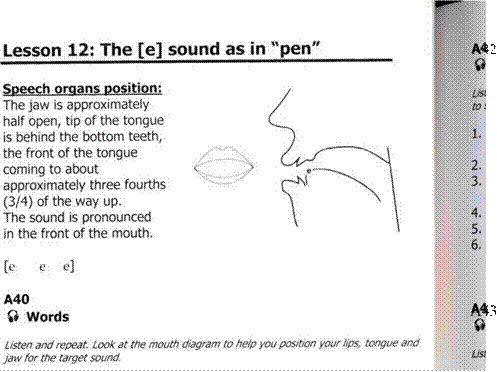 It's a real pleasure to rest on a nice leather sofa.
It's a real pleasure to rest on a nice leather sofa.
A red leather jacket was well presented on the display. The weather was wet and windy when the men were mending the fence.
Verses
Listen and copy the intonation and voice modulation on the CD.
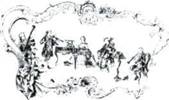 Let us gaily tread
the measure,
Let us gaily tread
the measure,
Make the most of fleeting leisure; Every moment brings a treasure, Of its own especial pleasure...
Let us gaily tread the measure.
Additional exercises:
A: Write down 4 words with the target sound that you often use when speaking English. Practice these words, thinking about your lips, tongue andjaw positions for the target sound.
1.
![]() 3.
3. ![]()
2. 4.
![]()
B: Write down 4 words with the target sound that you often hear on TV, radio or from pur friends/co//eagues. Practice these words, thinking about your lips, tongue andyaw positions for the target sound.
1.
![]() 3.
3.
2. 4.
41
![]()
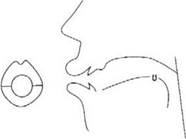 Speech organs
position: Lips rounded and forward a little, not as far forward as in long
vowel [u:] but very close. The jaw is almost closed, but not quite. The back of
the tongue is fairly high in the back of the mouth.
Speech organs
position: Lips rounded and forward a little, not as far forward as in long
vowel [u:] but very close. The jaw is almost closed, but not quite. The back of
the tongue is fairly high in the back of the mouth.
[U ![]()
A44
O Words
Listen and repeat. Look at the mouth diagram to help you position your lips, tongue and jaw for the target sound.
|
Spelling variations for the [UI sound |
Highlighted bold letters pronounced as [u] |
|
u |
put, push, full, butcher, spoonful, fulfil, cushion |
|
00, o |
book, look, good, wool, wood, wolf, foot, stood |
|
oul |
could, would, should |
A45
O Sentences
Listen and repeat. Read each sentence aloud slowly at first, then as ifyou were te//ing it to someone in a natural way,
![]()
1.
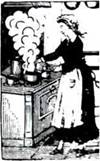 Could you put this good Worcester wool in the wooden
chest?
Could you put this good Worcester wool in the wooden
chest?
2.
The butcher saw a wolf looking in every nook ![]() for the fallen
rook.
for the fallen
rook.
3. Our cook couldn't cook without looking at his cookery book.
4. If I could just get off the hook and get rid of my responsibility to cook.
5. You could easily lose your foothold in the bulrushes by the brook on the way to the
42
|
1. |
|
 "Bull and Bush" pub.
"Bull and Bush" pub.
6. If you are preparing a pudding you must have sugar and a good cookery book.
Verses
Lbten and copy the intonation and voice modulation on the CD.
Would you take this book!
Could you leave that hook!
Let us walk by foot!
That sounds good!
We could, we would, we should!
Additional exercises:
• Write down 4 words with the target sound that you often use when speaking
English. Practice these words, thinking about your /ips, tongue andJaw positions for the target sound.
![]() 3.
3. ![]()
2. 4.
![]()
B.• Write down 4 words with the target sound that you often hear on TV, radio or from your friends/co/,'eagues. Practice these words, thinking about your lips, tongue andjaw positions for the target sound.
1.
![]() 3.
3.
2. 4.
![]()
43
Comparison [u] and [u:]
A47
O Contrast between short [UI and long [u:]
lul
could clue
foot full fruit
look put pool should shoes Additional exercises:
A.• Write down 4 words with the target sound that you often use when speaking English. practice these words, thinking about your lips, tongue andjaw positions for the nrget sound.
1. ![]()
2. 4.
![]()
![]()
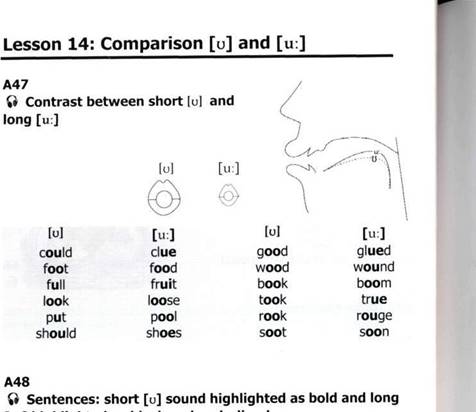 B: Write down 4 words with the target
sound that you often hear on IV, radio or from your friends/co//eagues.
Practice these words, thinking about your lips, tongue andjaw pŒitions for
the target sound.
B: Write down 4 words with the target
sound that you often hear on IV, radio or from your friends/co//eagues.
Practice these words, thinking about your lips, tongue andjaw pŒitions for
the target sound.
1. ![]() 3.
3. ![]()
2.4.
![]()
A48
O Sentences: short [u] sound
highlighted as bold and long ![]() highlighted as black and underlined
highlighted as black and underlined
Listen and repeat. Read each sentence aloud s/ow/y at first, then as ifyou were te//ing it to someone in a natural way.
1. The wounded wolf couldn't move his foot and soon fell asleep under the bush.
2. Worcester wool would suit beautifully for my ngy blue suit.
3. Natural foods contribute to a good diet.
4. Behaving loosely could be seen as and wouldn't improve your look.
5. Good books usually fulfil people's lives.
44 45
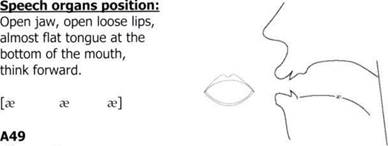 The
[æ] sound "cat"
The
[æ] sound "cat"
 |
 |
||
mess mass bend band bred brand
sat led land
Words
together gather
Listen and repeat. Look at the mouth diagram to help you position your lips, tongue and jaw for the target sound.
|
|
What It Pull For To |
![]()
![]()
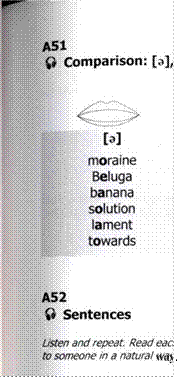 Japanese, barrage,
nationalities, bad, happened, land, understand, activity, prank, miraculous,
panther, ragged, man, actually
Japanese, barrage,
nationalities, bad, happened, land, understand, activity, prank, miraculous,
panther, ragged, man, actually
|
Comparison: [e] and [æJ sounds |
|
|
I. 2. 3. 4. |
A black fat cat was sad when he couldn't grab a slice of ham. It can be quite a challenge to manage a marriage. A man who looked unhappy sang a sad bad mad romantic song. As a habit I add some tomato to my hamburger. |
||
|
|
|
|
||||
|
men |
man |
|
bag |
|
5. |
Standing hand in hand, the man asked Jan for her hand in |
|
guessed |
gassed |
pet ten |
pat tan |
|
6. |
marriage. Can you manage to carry those magazines back to the rack? |
|
hem |
ham |
said |
sad |
|
|
|
|
hetero |
hand |
breath |
bandage |
|
|
|
|
wren |
rank |
kettle |
candle |
|
|
|
A50
Listen and repeat, Read each sentence aloud slowly at first, then as ifyou were telling it
46
A53 Verses

voice modulation on the CD.
was that? was the cat!
![]() ashore in fashion
steady, the clergyman is ready unite the happy pair!
ashore in fashion
steady, the clergyman is ready unite the happy pair!
47
Additional exercises:
A: Write down 4 words with the target sound that you often use when speaking English. Practice these words, thinking about your lips, tongue andjaw positions for the target sound.
1. 3.
![]()
2. 4.
![]()
B: Write down 4 words with the target sound that you often hear on TV, radio or from your friends/co//eagues. Practice these words, thinking about your lips, tongue andjaw
positions for the target sound.
1. 3.
![]()
2.
![]()
![]()
![]() 4.
4.
![]()
48 49
![]()
![]() Speech organs
position: Start with a relaxed schwa position [a] (Lesson 6), then bring
the lips forward into your short [u] as in "book" position.
Speech organs
position: Start with a relaxed schwa position [a] (Lesson 6), then bring
the lips forward into your short [u] as in "book" position.
[a a ao ![]() auauaul
auauaul
A54
G Words
Listen and repeat. Look at the mouth diagram to he/p you position your lips, tongue and jaw for the target sound.
Spelling variations Highlighted bold letters pronounced as [w] for the sound hope, role, focus, those, both, clothes, bold, open, whole road, oak, coat glow, sorrow, pillow, follow, sparrow, throw sew
A55
O Sentences
Listen and repeat. Read each sentence aloud s/ow/y at first, then as ifyou were te//ing it to someone in a natura/ way.
I. Joan has a cold in her nose because she rode her pony through the frozen snow.
2.
![]() The poetry of bold poems imposed a strange tone on the
whole show.
The poetry of bold poems imposed a strange tone on the
whole show.
3. I don't know when I will come home, although I am closely focusing on the road. But soon, most probably, I will know and will phone you as I come closer to our home.
4. When speaking on the podium keep your shoulders open!
50
5. Discharge your loathsome loads! Belch forth your venom, toads!
6. Joe, don't go to Oklahoma or Ohio but come home to Rome instead.
A56
Verses
![]() Listen and copy the intonation and
voice mdu/ation on the CD,
Listen and copy the intonation and
voice mdu/ation on the CD,
Moses supposes his toeses are roses,
But Moses supposes erroneously; For nobody's toeses are posies of roses As Moses supposes his toeses to be.
Additional exercises:
A• Write down 4 words with the target sound that you often use when speaking English. Practice these words, thinking about your lips, tongue andjaw positions for the target sound.
1. 3.
![]()
2. 4.
![]()
B: Write down 4 words with the target sound that you often hear on TV, radio or from your friends/co//eagues. Practice these words, thinking about your lips, tongue andjaw positions for the target sound.
1. 3.
![]()
2. 4.
![]()
51
![]()
![]() Speech organs position:
Speech organs position:
Starting with [e] as in "pet" (Lesson 10), and then tongue rises just a little to [l] as in "pit" (Lesson 7).
[e e el e e el et el el]
A57
O Words
Listen and repeat. Look at the mouth diagram to he/p you
position your lips, tongue and ![]() jaw for the target sound.
jaw for the target sound.
|
Spelling variations for the [ell sound |
Highlighted bold letters pronounced as [el] take, arrange, late, tape, amaze, change, shape, stimulate, populate |
|
ai |
aim, rainbow, vain, gain, plain pay, gay, tray, betray |
|
eigh, aigh |
weight, eight, straight |
A58
9 Sentences
![]() Listen and repeat. Read each sentence
aloud slowly at first, then as ifyou were telling it to someone in a natura/
way.
Listen and repeat. Read each sentence
aloud slowly at first, then as ifyou were telling it to someone in a natura/
way.
I. The train at eight was very late; we left the station with frustration.
2. Betrayed and amazed we aimed hastily for the Chain Walk brasserie.
3. We patiently waited in vain for our favourite table to become vacant.
4. To name your child with an ancient name some may consider insane!
5. All the favourite cakes that Jane had made were placed on trays. 6. You must pay any day if you are going away on the train.
52
![]() A59
A59
![]()
![]() Copy the intonation and modulate the voice after the CD.
Copy the intonation and modulate the voice after the CD.
Stay, Frederic, stay!
They have no legal claim,
No shadow of a shame
Will fall upon my name,
Additional exercises:
A.• Write down 4 words with the target sound that you often use when speaking English. Practice these words, thinking about your lips, tongue andjaw positions for the target sound.
![]()
2. 4.
![]()
B: Write down 4 words with the target sound that you often hear on TV, radio or from your friends/co//eagues. Practice these words, thinking about your lips, tongue andjaw g'sitions for the target sound.
1.3.
![]()
2.4.
![]()
53
![]()
![]() Speech organs
position; Starting with a long sound as in "court" (Lesson 3),
with the lips forward and quite tight, the jaw is fairly closed, the lips
relaxed. As you move the tongue it comes a little bit further forward to an [1]
position, as in "pit" (Lesson 7). The lips are loose and relaxed.
Speech organs
position; Starting with a long sound as in "court" (Lesson 3),
with the lips forward and quite tight, the jaw is fairly closed, the lips
relaxed. As you move the tongue it comes a little bit further forward to an [1]
position, as in "pit" (Lesson 7). The lips are loose and relaxed.
![]()
A60
O Words
Listen and repeat. Look at the mouth diagram to help you
position your lips, tongue and ![]() jaw for the target sound.
jaw for the target sound.
|
Spelling variations for the sound |
Highlighted bold letters pronounced as |
|
oi |
coin, exploit, moisture, boil, spoil, poise, anoint, soil, points, broil, foil, loiter |
|
OY |
enjoy, loyal, annoy, royal, toy, Lloyd, decoy, |
destroy
A61
Sentences
Listen and repeat. Read each sentence aloud s/ow/y at first, then as if you were telling it to someone in a natural way,
I. Troy was once destroyed by flamboyant noisy soldiers.
2. A noisy voice can be so annoying that the whole image can be spoiled.
3. Rice requires moist soil and months of toil.
4. Any noise annoys an oyster, but a noisy noise annoys an oyster most.
5. You can't enjoy the beef if the joint is covered with boiling oil.
54
6. Moira was very annoyed at the boisterous noise of her toy-boy enjoying his oysters.
A62
O Verses
Listen and copy the intonation and voice modulation on the CD.
![]() An orphan boy,
An orphan boy,
Forgo your cruel employ,
How sad — an orphan boy![]()
If pity you can feel,
Leave me my sole remaining joy —
Against the sad, sad tale of the lonely orphan boy!
Additional exercises
A• Write down 4 words with the target sound that you often use when speaking English. Practice these words, thinking about your lips, tongue andjaw positions for the target sound.
1. 3.
![]()
2. 4.
![]()
B: Write down 4 words with the target sound that you often hear on TV, radio or from your friends/co//eagues. Practice these words, thinking about your /tps, tongue andjaw g'sitions for the target sound.
1. 3.
![]()
2. 4.
![]()
55
Speech orqans position: Starting with a short [l] position as in "pit" (Lesson 7), then dropping the tongue back into the schwa [a] (Lesson 6).
[1 1 10 la la la]
A63
G Words
Listen and repeat. Look at the mouth diagram to he/p you position your lips, tongue and jaw for the target sound.
|
Spelling variations for the sound |
Highlighted bold letters pronounced as [la] cereal, nuclear, gear, nearly, theatre |
|
ie |
experience, bier, pier, cavalier |
|
io |
superior, exterior |
|
iou |
mysterious, curious, spurious |
|
ei |
weird, weir sphere, interfere, here, queer, peer, sheer |
A64
Sentences
5.
6. My tearfulness soon cleared when I met the dear, fearless, mysterious stranger.
A65
Verses
Listen and copy the intonation and voice modulation on the CD.
Sad is that woman's lot who, year by year,
Sees, one by one, her beauty disappear, When Time, grown weary of her heartdrawn sighs,
Impatiently begins to 'dim her eyes'!
Additional exercises:
A: Write down 4 words with the target sound that you often use when speaking English. Practice these words, thinking about your lips, tongue andjaw positions for the target sound.
1. 3.
2. 4.
B: Write down 4 words with the target sound that you often hear on TV, radio or from your friends/co//eagues. Practice these words, thinking about your lips, tongue andjaw positions for the target sound.
|
I. Vera, dear, wipe your tears, come near |
1. 3. |
|
here and forget your fear! 2. My experience of piercing Vera's ears was rather weird. 3. Really dear beer makes me cheerful but spurious beer makes me furious. 4. It was queer to experience a year with my cavalier peers at Lear's. |
2. 4. |
|
56 |
57 |
Listen and repeat. Read each sentence aloud slowly at first, then as if you were telling it to someone in a natural way.
![]()

A66
O Words
Listen and repeat. Look at the mouth diagram to he/p you position your lips, tongue and jaw for the target sound.
![]() Spelling
variations Highlighted bold letters pronounced as [al) for the [m]
sound sky, fly, cry, supply, terrify, deny idle, slide, shine, wild, advertise,
design, mind igh might, high, nigh, delight, right ui quite,
guide
Spelling
variations Highlighted bold letters pronounced as [al) for the [m]
sound sky, fly, cry, supply, terrify, deny idle, slide, shine, wild, advertise,
design, mind igh might, high, nigh, delight, right ui quite,
guide
A67
O Sentences
Listen and repeat. Read each sentence aloud slowly at first, then as ifyou were telling it to someone in a natural way.
I. Try to find a bright idea behind the rhymes of Oscar Wilde.
2. The sun is no longer high in the sky as the day declines.
3. "His wife is quite mild and kind." What? Are you blind?
4. There are some guys in St. Ives who have up to seven wives.
5. Holding their chins quite high nine knights were riding by.
6. Try not to be frightened of spiders, just hide when they come in sight — they won't bite!
7. Nine men with fine tenor voices decided to sing quite high in the choir on Friday night.
58
![]()
![]() Speech organs
position: Start with lips forward like for the short vowel [u] as in
"book" (Lesson 11), and then glide to the neutral [a] sound (Lesson
6) with the lips falling back and jaw opening.
Speech organs
position: Start with lips forward like for the short vowel [u] as in
"book" (Lesson 11), and then glide to the neutral [a] sound (Lesson
6) with the lips falling back and jaw opening.
![]() u uouaua]
u uouaua]
A69
O Words
Listen and repeat. Look at the mouth diagram to help you position your lips, tongue and jaw for the target sound.
|
Spelling variations for the [00] sound |
Highlighted bold letters pronounced as Loa] poor, moor, tour, jury, casual, lure, dour |
|
ur |
insure, rural, assure, Drury, plural sewer, jewel, brewer |
|
Spelling variations for the [joa] sound |
Highlighted bold letters pronounced as [joa] |
|
ur |
manure, pure, mature, obscure |
|
ua |
dual, fuel, manual |
|
we |
fewer |
A70
Sentences
Listen and repeat. Read each sentence aloud s/ow/y at first, then as ifyou were telling it to someone in a natural way.
1. The immature jury was unsure and could no longer endure spurious assurances.
2. Obscure rural moors allure Muriel more than luxurious jewels.
3. Dour Mr. Ruhr was enduring the cure after his fiasco in amour.
4. The pure girl was lured in the sewers by the furious steward.
60
5. I assure you, the rural Yorkshire moors are worth visiting on your tour of Europe.
A71
Verses
Listen and copy the intonation and voice modulation on the CD,
![]() False is he whose
vows alluring
False is he whose
vows alluring
Make the listening echoes ring; Sweet and low when all-enduring Are the songs the lovers sing!
Additional exercises:
A: Write down 4 words with the target sound that you often use when speaking English. Practice these words, thinking about your lips, tongue andjaw positions for the target sound.
1.
![]() 3.
3. ![]()
2. 4.
![]()
B: Write down 4 words with the target sound that you often hear on TV, radio or from pour fnends/co//eagues. Practice these words, thinking about your lips, tongue andjaw positions for the target sound.
1. ![]()
2. 4.
![]()
61
![]()
![]() Speech organs
position: Start with the vowel [e] as in "pet", with the lips
spread and the front of the tongue a little bit lifted in the front of the
mouth. Then the tongue relaxes back into the neutral [a] position and the lips
become floppy and loose.
Speech organs
position: Start with the vowel [e] as in "pet", with the lips
spread and the front of the tongue a little bit lifted in the front of the
mouth. Then the tongue relaxes back into the neutral [a] position and the lips
become floppy and loose.
[e e ea ee ea ea ea ea]
A72
O Words
Listen and repeat. Look at the mouth diagram to help you position your lips, tongue and jaw for the target sound.
Spelling variations Highlighted
bold letters pronounced as tea) ![]() for the sound air repair, fairy, despair, flair, mayor, pear a before
r precarious, scarcely, vicarious, nefarious, care are scares,
square, careless, compare, beware, glare
for the sound air repair, fairy, despair, flair, mayor, pear a before
r precarious, scarcely, vicarious, nefarious, care are scares,
square, careless, compare, beware, glare
A73
Sentences
Listen and repeat. Read each sentence aloud slowly at first, then as ifyou were telling it to someone in a natural way.
I. Please, take care of our heir! But beware, he can be unbearable.
2. I compared my questionnaire with Clare's and fell into despair as I become aware that my questionnaire was rather bare.
3. I cannot dare nor be able to bear an affair with a married man.
4.
![]() I like to wear my hair groomed with care.
I like to wear my hair groomed with care.
5. I'm prepared to swear that the Mayor rarely shared a hare.
6. Take care! These chairs have had their fair share of wear and tear.
62
A74
O Verses
![]() Listen and copy the intonation and
voice modulation on the CD.
Listen and copy the intonation and
voice modulation on the CD.
Oh! Chancellor unwary, Your attitude is vary!
Your badinage so airy,
Your manner arbitrary,
Are out of place
When face to face
With an influential Fairy.
Additional exercises:
A.• Write down 4 words with the target sound that you often use when speaking English Practice these words, thinking about your lips, tongue andjaw positions for the target sound
1.
![]() 3.
3. ![]()
2. 4.
![]()
B.• Write down 4 words with the target sound that you often hear on W, radio or from your friends/co//eagues. Practice these words, thinking about your lips, tongue andjaw A'sitions for the target sound.
1.
3. ![]()
![]()
2. 4.
![]()
63
![]()
![]() Speech organs
position: Starting with an open jaw position, a relaxed tongue and relaxed
lips; the sound is made in the front of the mouth, like in [a:] vowel (Lesson
1). Then the jaw closes and the lips come forward, the tongue rises at the back
of the mouth for [u] as in "book"
Speech organs
position: Starting with an open jaw position, a relaxed tongue and relaxed
lips; the sound is made in the front of the mouth, like in [a:] vowel (Lesson
1). Then the jaw closes and the lips come forward, the tongue rises at the back
of the mouth for [u] as in "book" ![]() (Lesson 13).
(Lesson 13).
[a a ao a a au ao ao ao]
A75
O Words
Listen and repeat. Look at the mouth diagram to help you your lips, tongue and jaw for the target sound.
Spelling variations Highlighted bold letters pronounced as ![]() for the Lao] sound ou found, mouse,
sprout, bounce, shout, loud, doubt, scout, mountain, thousand, fountain
for the Lao] sound ou found, mouse,
sprout, bounce, shout, loud, doubt, scout, mountain, thousand, fountain ![]() prow, trowel, vowel, owl, now, endow,
flower
prow, trowel, vowel, owl, now, endow,
flower
A76
Sentences
Listen and repeat. Read each sentence aloud s/ow/y at first, then as ifyou were te//ing it to someone in a natural way.
1.
![]() No doubt we can find thousands of flowers in the Swiss
mountains.
No doubt we can find thousands of flowers in the Swiss
mountains.
2. How now brown cow.
3. I saw a clown shouting in the town.
4. Here lies the body of Jonathan Pound who was last seen at sea and never found.
64
5. The loud sound of the hounds confounded the brown mouse.
6. With a shout, the boy found a thousand pounds to the south of the town.
A77
![]() O Verses
O Verses
Listen and copy the intonation and voice modulation on the CD.
Teddy worried about
The fact that he was rather stout.
But now he is proud of being short and stout.
Additional exercises:
A • Write down 4 words with the target sound that you often use when speaking English. Practice these words, thinking about your lips, tongue andjaw positions for the target
1. 3.
![]()
2. 4.
![]()
B: Write down 4 words with the target sound that you often hear on W, radio or from your friends/co//eagues. Practice these words, thinking about your lips, tongue andjaw positions for the target sound.
1. 3.
![]()
2. 4.
![]()
65
![]()
Semi-vowels are neither vowels nor consonants. The speech organs start as if you make a pure single vowel, but instead of making that sound, they immediately move to another sound.
![]() Speech orqans
position: [j], as in "yes": The tip of the tongue behind the
bottom teeth. The front of the tongue comes high in the mouth, as if you're
going to say as in feet. But before you can say [i:], the front of the tongue
drops rapidly to the neutral or schwa position [e] and it's that movement
coming down that forms the sound [jJ•
Speech orqans
position: [j], as in "yes": The tip of the tongue behind the
bottom teeth. The front of the tongue comes high in the mouth, as if you're
going to say as in feet. But before you can say [i:], the front of the tongue
drops rapidly to the neutral or schwa position [e] and it's that movement
coming down that forms the sound [jJ•![]()
O Words
Listen and repeat. Look at the mouth diagram to he/p you position your lips, tongue and jaw for the target sound.
Spelling variations Highlighted bold letters pronounced as [j]
for the [j] sound young, yes, you, yesterday, yard, yarn use, argue, value,
duty, huge, assume, refuse ![]() confuse, unisex new, fewer
confuse, unisex new, fewer
![]()
![]() 66
66
Sentences
Listen and repeat. Read each sentence aloud s/ow/y at first, then as ifyou were telling it to someone in a natura/ way.
1. Yesterday, we had to queue to get into Kew.
2. I refuse to argue with you. Excuse me, I have duties to pursue.
3. I was confused that the bank refused to accept my Euros.
4. The youth yelled out, "I yearn to go to York!"
5. You knew yesterday's news about the European yachts tour, didn't you?
6. In the European Union, the sound of beautiful music is not unique.
9 Verses
Listen and copy the intonation and voice modulation on the CD.
![]() Love that no wrong
can cure,
Love that no wrong
can cure,
Love that is always new,
Love that will aye endure,
Though the rewards be fewr That is the love that's pure, That is the love that's true!
Additional exercises:
A: Wnte down 4 words with the target sound that you often use when speaking English. Practice these words, thinking about your lips, tongue andjaw positions for the target sound.
1. 3.
![]()
2. 4.
![]()
B: Write down 4 words with the target sound that you often hear on TV, radio or from your friends/co//eagues. Practice these words, thinking about your //PS, tongue andjaw msitions for the target sound.
1. 3.
![]()
2. 4.
![]()
67
Semi-vowel [w] as "want"
![]()
![]()
![]() Speech organs position: The lips start as if they
are going to say [u:], as in "blue" (Lesson 2), but before they can
actually form the long vowel
Speech organs position: The lips start as if they
are going to say [u:], as in "blue" (Lesson 2), but before they can
actually form the long vowel ![]() they shoot back once again to a neutral
schwa position (Lesson 6), and it's the sound that is caused by the lips moving
back that makes the [w]. Project the lips well forward. The sound is fully
vocalized.
they shoot back once again to a neutral
schwa position (Lesson 6), and it's the sound that is caused by the lips moving
back that makes the [w]. Project the lips well forward. The sound is fully
vocalized.
Repeat once from left to right:

![]() O Repeat each line four times:
O Repeat each line four times:
1. Will you?
2.WiII you wait?
3.Will you wait for Willy?
4.Will you wait for Willy and Winnie?
5.Will you wait for Willy and Winnie Williams?
68
O Words
Listen and repeat. Look at the mouth diagram to help you position your bps, tongue and jaw for the target sound.
![]() Spelling variations Highlighted bold
letters pronounced as [w) for the [w] sound w wax, wolf, work, wait, want,
watch, weather wh whale, wheel, whether
Spelling variations Highlighted bold
letters pronounced as [w) for the [w] sound w wax, wolf, work, wait, want,
watch, weather wh whale, wheel, whether ![]() u after q queen, quench, quantity
once, someone
u after q queen, quench, quantity
once, someone
O Words: contrasts with [v] and [w]
Listen and repeat. Look at the mouth diagram to help you position your lips, tongue and jaw for the target sound.
|
|
|
wet west |
veal |
wheel wend |
|
|
vale |
whale |
vent |
went |
|
|
vain |
wane |
verse |
worse |
|
|
via |
wire |
vile |
while |
|
|
vine |
wine |
vim |
whim |
O Sentences
listen and repeat Read each sentence aloud slowly at first, then as ifyou were telling it to someone in a natural way.
1. Will you be required to work in Westwood on Wednesdays?
2. I wondered whether any one of you were willing to acquire our exquisite wines.
3. The qualitative results were not what we wanted from our quantifiable questionnaire questions.
4. Every one would want to have as a wife a wondrous wise woman with beautiful eyes.
5. A Welshman in Wellington boots wandered into the woods with his cool dudes.
69
6. He won the award for having won the world's worst worsted waistcoat.
B9
O Verses
![]() Instructions: Copy the intonation and
modulate the voice after the CD.
Instructions: Copy the intonation and
modulate the voice after the CD.
We are blind, and we would see;
We are bound, and we would be free; We are dumb, and we would talk; We are lame, and we would walk.
Additional exercises:
A • Write down 4 words with the target sound that you often use when speaking English. Practice these words, thinking about your lips, tongue andjaw positions for the target sound.
1. 3.
![]()
2. 4.
![]()
B: Write down 4 words with the target sound that you often hear on TV, radio or from your fnends/co//eagues. Practice these words, thinking about your lips, tongue andjaw
positions for the target sound.
1. 3.
![]()
2. 4.
![]()
70 71
![]()
When producing plosives the passage of the air is completely blocked by two speech organs coming together somewhere between the throat and the lips. Pressure is compressed behind them pushing the air. When the speech organs are suddenly released that trapped air which was completely pressed behind the blockage shoots out, and we hear a little explosion, that sound creates the consonant.
Speech organs position:
[p] and its partner [b] are made with the lips blocking the passage of the air. [p] is made purely with breath; [b] is made exactly the same way, but you vibrate the vocal chords to make a sound. If you block the passage of the air for a split second before you make [p], you can feel a little pressure behind the blockage and then you release it. Add voice to that explosion and you get [b]. Sharp, quick sounds.

O Words for unvoiced [p] sound
Listen and repeat. Look at the mouth diagram to help you position your lips, tongue and jaw for the target sound.
plate, place, pantry, parsley, perform, public, present, print, impromptu, pleasant, place, personal, property, precipitate
B12
G Sentences
Listen and repeat. Read each sentence aloud s/ow/y at first, then as ifyou were telling it to someone in a natural way.
I. The pact on "Privacy of Personal Property" was printed in the paper.
2. He gave a poor explanation of the possibility of postponing the preliminary plans to put a new production manager in place.
3.
Paul's preposterous impromptu performance was pretty personal and
lacked propriety.![]()
4. Penelope promoted a healthy peasant appearance in her new spring compilation.
5. Although pizzas are popular, most people prefer pretzels.
6. Pease porridge hot, pease porridge cold, pease porridge in the pot nine days old.
Stage I Stage 2 B13
G Tongue-twister
![]() Listen and
copy the intonation and voice modulation on the CD.
Listen and
copy the intonation and voice modulation on the CD.
BIO Peter Piper picked a peck of pickled peppers
![]() Repeat once from left to right: A
peck of pickled peppers Peter Piper picked
Repeat once from left to right: A
peck of pickled peppers Peter Piper picked
If Peter Piper picked a peck of pickled peppers p p p p Where's the peck of pickled peppers Peter Piper pp pp pp p picked? ppp ppp ppp p pppp pppp pppp p
72 73
B14 B17
O Articulation exercise Sentences
Listen and repeat, keeping consonants dear and crisp. Listen and repeat. Read each sentence aloud s/ow/y at first, then as ifyou were telling it to someone in a natural way.
A complicated gentleman allow me to present,
![]() Of
all the arts and faculties a terse 1. Bill Bobby bought a big black cab
and became a troubled cabman. embodiment:
Of
all the arts and faculties a terse 1. Bill Bobby bought a big black cab
and became a troubled cabman. embodiment:
A great arithmetician, who can demonstrate2. The Bible on the table belonged to Brenda Blenkin.
with ease,It was brilliant bursting bubbles in their billions during the ball in 3.
That two and two are three or five, orBelgravia.
anything you please:4. Bobby and Brenda saw a black bat and a big bumble bee at a
An eminent logician, who can make it clear tobarbecue with their neighbours.
5. The blackbird built a beautiful big nest. you
That black is white — when looked at from the proper point of view:
A marvellous philologist, who'll undertake to show, B18
That "yes" is but another form of "no". O Comparison: [p] and [b]
815 pocket bucket
![]() Repeat once from left to right: piece b pork bark bb bb bb point boiled
bbb bbb bbb panther bender bbbb bbbb bbbb b passport buzzword
Repeat once from left to right: piece b pork bark bb bb bb point boiled
bbb bbb bbb panther bender bbbb bbbb bbbb b passport buzzword
B16 B19
Words for voiced [b] O Tongue-twister: the voiced [b] sound
![]() Listen and repeat. Look at the mouth
diagram to he/p you position your lips, tongue and Instructions: Copy the
intonation and modulate the voice after the CD. jaw for the target sound.
Listen and repeat. Look at the mouth
diagram to he/p you position your lips, tongue and Instructions: Copy the
intonation and modulate the voice after the CD. jaw for the target sound.
Betty Botter bought some butter, bring, baby, Bob, snob, bomb, balm But, she said the butter's bitter;
Nasal plosion cabman, submit, submarine, sob noisily If I put it in my batter
Labial and lateral plosion babble, trouble, gobble, table, double It will make my batter bitter,
But a bit of better butter,
That would make my batter better.
![]()
74 75
820
O Articulation exercise
Instructions: Make consonants dear and crisp.
Bibby Bobby bought a bat; Bibby Bobby bought a ball,
With that bat he banged the ball, banged it bump against the wall, But so boldly Bobby banged, soon he burst the rubber ball.
BOO sobbed Bobby, goodbye ball. Bad luck, Bobby, bad luck ball.
Now to drown his many troubles, Bibby Bobby's blowing
bubbles!![]()
Additional exercises:
A: Write down 4 words with the target sound that you often use
when speaking English. Practice these words, thinking about your lips, tongue
andjaw positions for the ![]() target sound.
target sound.
1. ![]() 3.
3. ![]()
2. ![]() 4.
4.
B: Write down 4 words with the target sound that you often hear on TV, radio or from your friends/co//eagues. Practice these words, thinking about your lips, tongue andjaw positions for the target sound.
1.
![]() 3.
3. ![]()
2. 4.
![]()
76 ![]() 77
77
![]()
Plosive unvoiced [t]B23 as in "tent" and voiced [d] as in "dog" Sentences: unvoiced [t] sound
![]()
Listen and repeat. Read each sentence aloud s/ow/y at first, then as ifyou were telling it Speech Qrgans position: to someone in a natural way.
Sounds
are made with the tip of the tongue going up to the alveolar ![]()
|
ridge, the gummed ridge behind the top teeth. There is a blockage for |
I. |
Students taught by a private tutor from Eton passed all university tests with outstanding results. |
|
a split second; the tongue tip comes down sharply, the breath escapes |
2. |
Little tots were shocked by the tumultuous shouting sound of the |
|
and we get [t]. Add sound and we get [d]. |
|
waters. |
3.
![]() When playing table tennis, take turns every thirty minutes
to avoid fatigue.
When playing table tennis, take turns every thirty minutes
to avoid fatigue.
4. Try to teach tots with tolerance and tact.
5.
![]() The river Trent tends to be a trickle rather than a
torrent.
The river Trent tends to be a trickle rather than a
torrent.
B24
Verses
Stage 1 Stage 2 Listen and copy the intonation and voice modulation on the CD.
B21
![]() Repeat once from left to right: Timothy
Titus took two ties t To tie two tulips to two tall trees, tt tt tt To
terrify the terrible Thomas and t Tullamees. t
Repeat once from left to right: Timothy
Titus took two ties t To tie two tulips to two tall trees, tt tt tt To
terrify the terrible Thomas and t Tullamees. t
B25
822 O Repeat once from left to right:
O Words: unvoiced [t] sound d d d d
dd Osten and repeat. Look at the mouth diagram to help you position your lips, ddd tongue andjaw for the target sound. dddd ten, tiny, tortoise, taught, try, test, text, flute, tutor, tots, turn, table, tennis, trot, tumultuous, tactless, terrific, traffic, totalitarian
78
|
dd |
dd |
d |
|
ddd |
ddd |
d |
|
dddd |
dddd |
d |
79
B26
O Words: voiced [d] sound
Listen and repeat. Look at the mouth diagram to help you position your lips, tongue and jaw for the target sound.
diligent, drought, durable, did, done, drill, drag, dwell, dangerous, damage, diminish, diversified, dandruff, downdraft, dedicate
827
![]() Comparison: [t] and [d]
Comparison: [t] and [d]
|
cart |
card |
|
tell |
dwell |
|
write |
ride |
|
tree |
dream |
|
trout |
drought |
|
tart |
bard |
B28
O Sentences: voiced [d) sound
Listen and repeat. Read each sentence aloud slowly at first, then as if you were telling it to someone in a natural way.
I. Dunhill's due diligence revealed double standards in the production of different brands.
2, Douglas' daughter Deborah turned out to be a distinguished dancer.
3. I've studied the documentation for the new kidney drug in detail.
4. The dedicated student devoted to drama achieved dramatic results of immense depth.
5. Duke Douglas dealt mainly with ducks and drakes.
80
B29
G Verses
Listen and copy the intonation and voice modulation on the CD.
Tormented with the anguish dread Of falsehood unatoned, I lay upon my sleepless bed,
And tossed and turned and groaned.
B30
G Articulation exercise
Listen and repeat, keeping consonants dear and crisp.
What a to do to die today at a minute or two to two
A thing distinctly hard to say but harder still to do
For they'll beat a tattoo at twenty to two a Ra ta ta ta ta ta ta ta ta too
And the dragon will come when he hears the drum
At a minute or two to two today at a minute or two to two.
Additional exercises:
A: Write down 4 vvords with the target sound that you often use when speaking English. Practice these words, thinking about your lips, tongue andjaw positions for the target sound.
1. 3.
2. 4.
B: Write down 4 words with the target sound that you often hear on TV, radio or from your fnends/co//eagues. Practice these words, thinking about your lips, tongue andjaw positions for the target sound.
1. 3.
2. 4.
81
Speech organs position:
The tip of the tongue behind the bottom teeth, it's the back of the tongue going right up to make contact with the soft palate at the back of the roof of the mouth, and that forms the blockage. Then let the tongue come down and the air escapes in that little explosion and you get [k]; add voice and you get [g].
Stage I Stage 2
O Repeat once from left to right:
|
k |
k |
k |
k |
|
kk |
|
|
k |
|
kick |
kkk |
kkk |
k |
|
kkkk |
kkkk |
kkkk |
|
833
G Sentences: the unvoiced [k] sound
Listen and repeat. Read each sentence aloud s/ow/y at first, then as ifyou were te//ing it to someone in a natural way.
1. Kurt can't keep his cool when criticised by his uncle.
2. Catastrophic repercussions concerning chaotic confusion in clerical circles were kept quiet.
3. For a snack Cliff had crunchy crisps, cake with creamy custard and a cup of milky coffee.
4. Charismatic Clara was keen to wear kinky clothes.
5. Constance collected coins and costumes from Canada and Cambodia.
B34
O Verses
Listen and copy the intonation and voice modulation on the CD.
There was a crooked man, And he walked a crooked mile,
He found a crooked sixpence
Against a crooked stile;
He bought a crooked cat,
Which caught a crooked mouse, And they all lived together In a little crooked house.
O Words: the unvoiced [k] sound
Listen and repeat. Look at the mouth diagram to help you position your lips, tongue and jaw for the target sound
Spelling variations Highlighted bold letters pronounced as [k] for the [k] sound sketch, keep, Kenya, ketchup, key, kind q quite, quick, request, squeeze, antique c cat, curious, magic, uncle, historical, holistic ch charismatic, stomach, chemist, chaos, chord
82 83
B35
O Repeat once from left to right:
gg ggg ggg ggg gggg gggg gggg
O Words: voiced [g] sound
Listen and repeat. Look at the mouth diagram to jaw for the target sound.
Spelling variations Highlighted bold letters for the [g] sound guessed, guard, ghost, angle, single, signal, x-[gz] exact, examination, exasperate, existing
|
help you position your lips, tongue and pronounced as [g] plague, glue, struggle, language exaggerate, exert, graze
rugby glass ghost gone at first, then as ifyou were telling it him a vague giggle. grammar exam and was glad to guy. gleaming globe. |
|
|
B39 Tongue-twister
Green were the geese and green was the grazing. B40 G Articulation exercise Listen and repeat, keeping consonants dear and crisp. pt pt pt pt kt kt kt kt ptkt ptkt ptkt ptkt bd bd bd bd gd gd gd bdgd bdgd bdgd bdgd Additional exercises: A: Write down 4 words with the target sound that you often use when speaking English. Practice these words, thinking about your lips, tongue andjaw positions for the target sound. 1.
2. 4.
B: Write down 4 words with the target sound that you often hear on W, radio or from your fnends/co//eagues. Practice these words, thinking about your lips, tongue andjaw positions for the target sound. 1. 2. 85 |
B37
![]() Comparison: [k] and [g]
Comparison: [k] and [g]
creasy request climax coast con
B38
O Sentences: voiced [g] sound
Listen and repeat. Read each sentence aloud slowly to someone in a natural way.
1. Gladys glanced at Graham and gave
2. Grace struggled with her Greek get a great grade.
3. Gilbert Green is no longer a single
4. Gracious Gloria gazed at the exaggerated
84
[m] as in
Description of nasal consonants:
Two blockages to make the breath go straight into the nose. First of all the most important blockage is at the soft palate which is right at the back of the roof of the mouth; it actually is lowered, so that it stops the breath from coming from the lungs and the throat into the mouth and it has to come up and out of the nose. At the same time we have three little positions of the speech organs which also form the blockage in the case of: [m], [n] and
Speech organs position:
the lips come together, so that the breath cannot escape; the sound is produced in the nose.
B41
Words: the [m) sound
Listen and repeat. Look at the mouth diagram to help you position your lips, tongue and jaw for the target sound.
move, immortal, comb, smoke, asthma, prism, melody, maverick, melancholic, Manchester, mirror, monster, mimosa, meaning
O Sentences: the [m] sound
Listen and repeat. Read each sentence aloud slow/y at first, then as if you were telling it to someone in a natural way.
1. The manager from Manchester recommended making more money.
2. Mozart's melancholic melodies have bottomless meaning.
3. "The moon looks like a mottled melon," murmured Mark.
4. Margaret must be on time for her morning lessons in mime.
5. Mobiles made in Malaysia meet the needs of the most demanding of customers.
6. Minnie Mouse was moving to the chasm in the marble mausoleum.
86
![]() B43
B43
O Tongue-twister: the [m] sound
Listen and copy the intonation and voice modulation CD.
![]() Hie to the market, Mimi
come trot, Spilt all her butter milk, every drop.
Hie to the market, Mimi
come trot, Spilt all her butter milk, every drop.
Every drop and every dram,
Mimi came home with an empty can.
G Articulation exercise
Listen and repeat, keepng consonants dear and crisp.
My boy you may take it from me,
That of all the afflictions accursed
With which a man's saddled and hampered and addled,
A diffident nature's the worst.
Though clever as clever can be
A Crichton of early romance
You must stir it and stump it and blow your own trumpet, Or trust me you havent a chance!
Now take for example my case
I've a bright intellectual brain
In all London city there's no one so witty — I thought so again and again.
I've a highly intelligent face —
My features cannot be denied — But whatever I try, Sir, I fail in, and why Sir? I'm modesty personified!
87
Additional exercises:
A.• Write down 4 words with the target sound that you often use when speaking English. Practice these words, thinking about your bps, tongue andjaw posit/ons for the target sound.
1. 3.
![]()
2. 4.
![]()
B.• Write down 4 words with the target sound that you often hear on TV, radio or from your fnends/co//eagues. Practice these words, thinking about your bps, tongue andjaw positions for the target sound.
1. 3.
![]()
2.
![]()
![]() 4.
4.
![]()
89
88
Speech organs position fer the rnl
![]() The
tip of the tongue is on the alveolar ridge, but the soft palate coming down,
the
The
tip of the tongue is on the alveolar ridge, but the soft palate coming down,
the ![]() sound is produced in the nose. Keep the
tongue still while making the sound and then relax.
sound is produced in the nose. Keep the
tongue still while making the sound and then relax.
B45
![]() O Words
O Words
Listen and repeat. Look at the mouth diagram to help you position your lips, tongue and jaw for the target sound.
Spelling variations Highlighted bold letters pronounced as [n]
![]() for the [n] sound n noble, nunnery, nimble, naughty, nine, never, nest,
lawn, dawn, upon, down, penny, again, son kn knickers, knit, knowledge, known
for the [n] sound n noble, nunnery, nimble, naughty, nine, never, nest,
lawn, dawn, upon, down, penny, again, son kn knickers, knit, knowledge, known
B46
O Sentences
Listen and repeat, Read each sentence aloud s/ow/y at first, then as ifyou were telling it to someone in a natural way.
1. Nina wouldn't give her phone number to just anyone.
2. I neither understand nor instantly admire ignorant, narrow-minded, opinionated men without inner fire.
3. Anne finds the news from foreign countries informative and interesting.
4. Naughty Nick sneaked off to Aunt Annie's barn and napped till noon like a baboon.
5. At nine in the morning, the train for Nottingham comes down the line.
6.
![]()
![]() Neither
Nina nor Nita needed new knitted knickers.
Neither
Nina nor Nita needed new knitted knickers.
90
![]()
![]() B47
B47
![]() O Verses
O Verses
Listen and
For every evil under the sun,
There is a remedy or there is none.
If there be one, try and find it;
If there be none, never mind it.
Additional exercises:
A: Write down 4 words with the target sound that you often use when speaking English. Practice these words, thinking about your lips, tongue andjaw positions for the target sound.
1.
![]() 3.
3.
2. 4.
![]()
B: Write down 4 words with the target sound that you often hear on TV, radio or from your friends/co//eagues. Practice these words, thinking about your lips, tongue andjaw positions for the target sound
1. 3.
![]()
2.4.
![]()
91
G Verses: the [9] sound
![]()
![]() Listen and copy the intonation and CD.
sound:
Listen and copy the intonation and CD.
sound:
The tip of the tongue is![]() Gaily tripping, down
behind the bottom teeth,Lightly skipping, but the back of the tongueFlock the
maidens to the shipping. goes up to the soft palate,Flags and guns and pennants
dipping! forming a blockage. All the ladies love the shipping
Gaily tripping, down
behind the bottom teeth,Lightly skipping, but the back of the tongueFlock the
maidens to the shipping. goes up to the soft palate,Flags and guns and pennants
dipping! forming a blockage. All the ladies love the shipping![]()
B48
O Words: the [9] sound ![]() Additional exercises:
Additional exercises:
![]()
![]()
![]() Listen and repeat. look at the mouth
diagram to help you position your lips, tongue andA: Write down 4 words with
the target sound that you often use when speaking jaw for the target sound. English.
Practice these words, thinking about your lips, tongue andjaw positions for the
Spelling variations for
Listen and repeat. look at the mouth
diagram to help you position your lips, tongue andA: Write down 4 words with
the target sound that you often use when speaking jaw for the target sound. English.
Practice these words, thinking about your lips, tongue andjaw positions for the
Spelling variations for ![]() Highlighted bold letters pronounced as [O] target sound. ng wing, sing,
sung, ring, hang, bring, cling,
Highlighted bold letters pronounced as [O] target sound. ng wing, sing,
sung, ring, hang, bring, cling, ![]() sting, among, tongue, nothing, sailing, 1.
sting, among, tongue, nothing, sailing, 1. ![]() 3.
3. ![]() railing n before k think, wink, bank, honk 2.
railing n before k think, wink, bank, honk 2. ![]() 4.
4. ![]()
|
Speech organs position for the |
|
![]()
![]()
![]()
![]()
![]() B: Write down 4 words with the target
sound that you often hear on IV, radio or from your friends/co//eagues.
Practice these words, thinking about your lips, tongue andjaw
B: Write down 4 words with the target
sound that you often hear on IV, radio or from your friends/co//eagues.
Practice these words, thinking about your lips, tongue andjaw
B49 positions for the target sound.
O Sentences: the sound
1.
![]() 3.
3. ![]() Listen and repeat. Read each sentence aloud s/ow/y at first, then as ifyou
were telling it to someone in a natural way.
Listen and repeat. Read each sentence aloud s/ow/y at first, then as ifyou
were telling it to someone in a natural way.
2. 4.
![]()
I. The young singer was singing a rousing song.
2. At the beginning of this morning's class we were practicing tongue exercises.
3.
Without thinking,
the King swung on the bell and it rang with a ting-a-ling![]()
4. Paying rent, commuting, eating and drinking has been taking all the money I was earning from typing, writing and publicising.
5. Supposing he is coming for a meeting, will you be telling him about separating and leaving Hastings?
92 ![]() 93
93
Speech organs position:
When the nasal consonant [n] is preceded by either of the plosive consonants [t] or [d], the tip of the tongue stays on the alveolar ridge while the sounds are made at the same time and the breath escapes from the nose.
Words
Listen and repeat. Look at the mouth diagram to he/p you position your lips, tongue and jaw for the target sound.
![]() till mutton, cotton, button, eaten,
Eton, threaten, kitten, curtain, certain, heighten, tighten, fatten, frighten,
beaten
till mutton, cotton, button, eaten,
Eton, threaten, kitten, curtain, certain, heighten, tighten, fatten, frighten,
beaten ![]() hidden, burden, sadden, Haydn, pardon, sudden, madden,
hidden, burden, sadden, Haydn, pardon, sudden, madden, ![]() maiden, gladden, harden, suddenly,
garden, modern
maiden, gladden, harden, suddenly,
garden, modern
O Sentences
Listen and repeat. Read each sentence aloud s/ow/y at first, then as ifyou were telling it to someone in a natural way.
[tnl]
I. For my graduation from Eton, I certainly need a nice white cotton shirt with buttons.
2. The police threatened to tighten the rules for entering the country.
3.
You must always be certain to tighten the cords when hanging ![]() your
curtains.
your
curtains.
1. I would be glad to get rid of some burdens of our modern life.
2. A frightened maiden has been hidden in the rear garden.
3. Haydn is not a modern composer but his music will either sadden, gladden or madden you.
94
![]()
![]()
O Verses
Listen and CD.
![]() Three little kittens
They lost their mittens, And they began to cry: Oh, mother dear,
Three little kittens
They lost their mittens, And they began to cry: Oh, mother dear,
We sadly fear
Our mittens we have lost. What! Lost your mittens, You naughty kittens!
Then you shall have no pie.
B54
Articulation exercise
Listen and repeat, keeping consonants dear and crisp.
Major-General
![]() I am the very model
of a modern Major-General I've information vegetable, animal and mineral. I
know the kings of England and I quote the fights historical
I am the very model
of a modern Major-General I've information vegetable, animal and mineral. I
know the kings of England and I quote the fights historical
From Marathon to Waterloo, in order categorical;
I'm very well acquainted too with
matters mathematical.![]()
I understand equations, both the simple and quadratical,
About binomial theorem I'm teeming with a lot of news —
With many cheerful facts about the square Of the hypotenuse.
I'm very good at integral and differential calculus; I know the scientific names of beings animalculous; In short, in matters vegetable, animal and mineral, I am the very model of a modern Major-General.
95
Additional exercises:
A: Write down 4 words with the target sound that you often use when speaking English. Practice these words, thinking about your lips, tongue andjaw positions for the target sound.
1.
![]() 3.
3. ![]()
2. 4.
![]()
B: Write down 4 words with the target sound that you often hear on IV, radio or from your fnends/co//eagues. Practice these words, thinking about your lips, tongue andjaw positions for the target sound.
![]()
![]() 1.
1. ![]() 3.
3. ![]()
![]()
96
97
![]()
![]() Speech organs
position: Air escapes out of the side of the tongue. The tip of the tongue
is on the alveolar ridge and the back of the tongue down; the breath has to
come out of the side of the tongue to escape.
Speech organs
position: Air escapes out of the side of the tongue. The tip of the tongue
is on the alveolar ridge and the back of the tongue down; the breath has to
come out of the side of the tongue to escape.
B55
G Words
![]() Listen and repeat. Look at the mouth
diagram to help you position your lips, tongue and jaw for the target sound.
Listen and repeat. Look at the mouth
diagram to help you position your lips, tongue and jaw for the target sound.
leave, last, letter, love, lend, alone, allow, silly, chilly, fellow, shallow, holy, hollow, believe, place, plastic, blame, blue, blood, glue, glow, click, cloth, clumsy, club
856
Sentences
Listen and repeat. Read each sentence aloud slowly at first, then as ifyou were telling it to someone in a natural way.
I, Millions of letters, I believe, can be easily lost due to Royal Mail faults,
2.
![]() Luminous lamps light the whole hall marvellously.
Luminous lamps light the whole hall marvellously.
3. Luke's ludicrous letters to Lucia are unbelievable.
4. She looked supple and elegant in her black Channel jacket.
5. Red leather, yellow leather, red leather, yellow leather.
6.
Failure to calculate the yield of the field made the clever lad
ill![]()
98
![]() B57
B57
G Verses
Listen and voice modulation CD.
![]() The Nightingale told
his tale
The Nightingale told
his tale
In his own melodious way!
The lowly vale
For the mountain vainly sighed, To his humble wail
The echoing hills replied.
Additional exercises
A.• Write down 4 words with the target sound that you often use when speaking English. Practice these words, thinking about your lips, tongue andjaw positions for the target sound.
1. 3.
![]()
2. 4.
![]()
B: Write down 4
words with the target sound that you often hear on IV, radio or from your
friends/co//eagues. Practice these words, thinking about your lips, tongue
andjaw ![]() positions for the target sound.
positions for the target sound.
1.3.
![]()
2. 4.
![]()
99
![]()
Speech organs position:
When the lateral consonant [l] is preceded by
either of the plosive consonants [t] or [d], the tip of the tongue stays on the
alveolar ridge ![]() while the two sounds are made at the same
time and the breath escapes from the sides of the tongue.
while the two sounds are made at the same
time and the breath escapes from the sides of the tongue.
B58
O Words
Listen and repeat. Look at the mouth diagram to help you position your lips, tongue and jaw for the target sound.
![]()
tll cattle, subtle, settle, rattle,
total, mental, gentle, kettle, battle, brittle, metal, mettle, capital, vital,
gentlemen, little dll riddle, saddle, cuddle, candle, noodle, meddle, medal,
bundle, pedal, tidal, fiddle, handle, poodle, paddle, middle, ![]() bridal
bridal
B59
O Sentences
Listen and repeat. Read each sentence aloud slowly at first, then as ifyou were telling it to someone in a natura/ way.
I. It is vital for a gentleman to be subtle.
2. Gentlemen, let's estimate the total capital gain from our Seattle metal factory sale.
3. Little Lilly is so silly to fall in love with little Billy.
4. The noise of the pistols in the battle caused the cattle to be unsettled.
![]() I. Give a cuddle to
that little poodle!
I. Give a cuddle to
that little poodle!
2. For our bridal candle-lit supper we enjoyed Thai noodles.
3. Paddling to the middle of the tidal river deserves a bundle of medals.
100
O Verses
Listen and copy the intonation and voice modulation on the CD.
Doctor Fridle went to Briddle
![]() In a shower of rain;
He stepped in a puddle, Right up to his middle,
In a shower of rain;
He stepped in a puddle, Right up to his middle,
And never went there again.
Of a little take a little,
You are kindly welcome too; Of a little leave a little, This matters so to do.
Additional exercises:
A• Write down 4 words with the target sound that you often use when speaking English. Practice these words, thinking about your lips, tongue andjaw positions for the target sound.
1. 3.
![]()
2. 4.
![]()
B: Write down 4 words with the target sound that you often hear on TV, radio or from your friends/co,'/eagues. Practice these words, thinking about your lips, tongue andjaw positions for the target sound.
1.3.
![]()
2. 4.
![]()
101
Description of the fricative consonants:
The passage of the air is not blocked completely; it is narrowed by two speech organs coming very close together, so the breath has to squeeze its way past and as it squeezes through the small gap sets a little bit of friction, and that friction creates a sound.
Speech organs position: It's the top teeth which gently make contact with the bottom lip. The air can squeeze past. Without any sound it forms [f] as in "fish' add sound to that, and you get [v].
B61
G Words: the unvoiced [f] sound
Listen and repeat Look at the mouth diagram to he/p you position your lips, tongue and jaw for the target sound.
Spelling variations Highlighted bold letters pronounced as [f] for the [f] sound feast, first, cleft, lift, fantasy, fantastic, finish ft soften, often ph pharmacy, phone, photograph, philosophy, physics, philharmonic gh rough, tough, laugh
B62
Sentences: the unvoiced [f] sound
Listen and repeat. Read each sentence aloud slowly at first, then as ifyou were telling it to someone in a natura/ way.
I. Formidable Ralph was a true philanthropist; in fact, he often improved the life of those who felt left out.
2. Philip made an effort to find his girlfriend's favourite fuchsia flowers.
3. An old fisherman laughed when he caught five fresh fish.
102
4. Frosty frost in the fridge was freezing; we needed to fix some fuel to defrost the fish fingers.
5. The fifty friends from far-flung foreign lands formed a fraternity.
B63
O Verses: the unvoiced [f] sound
Listen and copy the intonation and voice modulation on the CD.
![]() Freddy farmer went to
Frinton And went fishing in the fog.
Freddy farmer went to
Frinton And went fishing in the fog.
When he though he'd caught a fish In fact he caught a frog!
864
O Words: the voiced [v] sound
Listen and repeat. Look at the mouth diagram to he/p you position your lips, tongue and jaw for the target sound
vote, virtue, develop, revive, vivacious, involve, arrive, convince, thrive, shove, vacuum, Steven, revival, vinegar, volume, velour
B65
O Comparison: [f] and [v]
|
fat |
vat |
|
file |
vile |
|
fail |
vale |
|
shift |
shove |
|
effort |
evidence |
|
focus |
vocal |
103
B66
O Sentences: the voiced [v] sound
Listen and repeat. Read each sentence aloud s/ow/y at first, then as ifyou were te//ing it to someone in a natural way.
I. Effervescent Vera tried to achieve marvellous results in vain.
2. Vindictive vendors convinced naive Victor to buy overpriced velvet and velour.
3. Vivacious Vivian loved to voice vigorous verses vociferously.
4. Steven vainly viewed vast vales with vacant eyes.
5. "There are very many varieties of vegetation on our veranda," said Vera.
B67
G Verses: the [v] sound
Listen and copy the intonation and voice modulation on the CD.
Vera vaulted vainly over the garden wall, Vera very nearly had a nasty fall.
Additional exercises:
A • Write down 4 words with the target sound that you often use when speaking English. Practice these words, thinking about your lips, tongue andjaw positions for the target sound.
1. 3.
2. 4.
B.• Write down 4 words with the target sound that you often hear on TV, radio or from your friends/co//eagues. Practice these words, thinking about your lips, tongue andjaw positions for the target sound.
1. 3.
2. 4.
104 105
![]()
![]()
![]() consonant [6] as in
consonant [6] as in
Speech organs position: The tip of the tongue
comes between top and bottom teeth gently, breath squeezes past, we hear the
unvoiced ![]() as in "think"; add sound to the
same process and you get [òJ, as in "the".
as in "think"; add sound to the
same process and you get [òJ, as in "the".
Words
![]()
Listen and repeat. Look at the mouth
diagram to help you position your lips, tongue and ![]() jaw for the target sound.
jaw for the target sound.
th thanks,
three, third, thought, thumb, thing, thin, bath, breath, cloth, tenth, sixth,
truth, both, author, arithmetic ![]()
![]()
B69
O Sentences ![]()
![]() Listen and repeat. Read each sentence
aloud slowly at first, then as if you were telling it
Listen and repeat. Read each sentence
aloud slowly at first, then as if you were telling it ![]() to someone in a natural way.
to someone in a natural way.
1. Three filthy looking thieves were hiding in the thicket of thorny thistle bushes.
2. The author revealed the uncouth truth in his latest thriller.
3. Thelma thought that theocratic thinking was thrilling.
4.
Arithmetical theorems come from thorough thinking of ![]() enthusiastic
arithmeticians.
enthusiastic
arithmeticians.
5. One wealthy author only wrote the truth and not filth.
![]()
106 ![]()
B70 O Comparison: [t] and [9]
|
taught |
thought |
|
trick |
thick |
|
tin |
thin |
|
note |
north |
|
matt |
mouth |
|
trade |
thread hearth |
![]() Tongue-twister
Tongue-twister
Listen and copy the intonation and voice modulation on the CD.
![]() A Thatcher of
Thatchwood went to Thatcher a-thatching; Did the of Thatcher of Thatchwood go
to Thatcher a-thatching ? If a Thatcher of Thatchwood went to Thatcher
a-thatching, Where is the thatching the
A Thatcher of
Thatchwood went to Thatcher a-thatching; Did the of Thatcher of Thatchwood go
to Thatcher a-thatching ? If a Thatcher of Thatchwood went to Thatcher
a-thatching, Where is the thatching the
thatcher of Thatchwood has thatched?
Additional exercises:
A: Write down 4 words with the target sound that you often use when speaking English. Practice these words, thinking about your lips, tongue andjaw positions for the target sound
1.
![]() 3.
3.
2. 4.
![]()
![]() B.• Write
down 4 words with the target sound that you often hear on TV, radio or from your
friends/co//eagues. Practice these words, thinking about your lips, tongue
andjaw positions for the target sound. 1. 3.
B.• Write
down 4 words with the target sound that you often hear on TV, radio or from your
friends/co//eagues. Practice these words, thinking about your lips, tongue
andjaw positions for the target sound. 1. 3.
2. 4.
![]()
107
Lesson 37: Voiced consonant [ð] as in
O Words
Listen and repeat. Look at the mouth diagram to help you position your lips, tongue and jaw for the target sound.
though, that, therefore, than, bathe, with, smooth, clothe, soothe, breathe, father, other, gather, rather, further, either
Sentences
Listen and repeat. Read each sentence aloud slowly at first, then as ifyou were te//ing it to someone in a natura/ way.
1. This medicine is soothing for my rather sore back.
2. I would rather buy this leather hat than that one with the feathers.
3. My mother and father adore my younger brother for being rather smarter than I.
4. That brown leather coat is made of smoother leather than that black one in the window.
5. The southerly wind blew this way and that across the Scottish heather.
874
O Verses
Listen and copy the intonation and voice modulation on the CD.
The soldiers of our Queen
Are linked in friendly tether; Upon the battle scene They fight the foe together.
There every mother's son
Prepared to fight and fall is; The enemy of one
The enemy of all is!
108
Additional exercises:
A.• Write down 4 words with the target sound that you omen use when speaking Enghsh. Practice these words, thinking about your lips, tongue andjaw positions for the target sound.
1. 3.
2. 4.
B: Write down 4 words with the target sound that you often hear on TV, radio or from your friends/co//eagues. Practice these words, thinking about your lips, tongue andjaw positions for the target sound.
1. 3.
2. 4.
109
|
Spelling variations for the [s] sound |
Highlighted bold letters pronounced as [s) |
|
s |
swan, base, chase, paradise, practise, promise, gas, atlas, takes scientific, science, scent |
|
c |
finance, cemetery, circumstances, receive |
Speech organs position:
The air escapes through a narrow passage along the centre of the tongue which squeezes between the top of the tongue and the alveolar ridge and you get [s] as in "sip"; add sound and you get [z].
B75
O Words: the unvoiced [s] sound
Listen and repeat. Look at the mouth diagram to help you your lips, tongue and jaw for the target sound.
O Sentences: the unvoiced [s] sound
Listen and repeat. Read each sentence aloud slowly at first, then as ifyou were telling it to someone in a natural way.
I. Sort these books on the staircase as soon as you have a spare second.
2. For supper, we've been served tasty sword fish with lemon sauce and succulent salad.
3. The symphony seemed sad and sentimental.
4. Simon saw seven silver swifts in the sea.
5.
![]() Steven Smith stood
seven foot six in his stocking feet.
Steven Smith stood
seven foot six in his stocking feet.
110 ![]()
B77
![]() G Verses: the unvoiced [s] sound
G Verses: the unvoiced [s] sound
Listen and copy the intonation and voice modulation on the CD.
Steven thought he sang so sweetly
In his office everyday, But so tuneless was his singing He was paid to go away...
O Words: the voiced [z] sound
Listen and repeat. Look at the mouth diagram to help you position your lips, tongue and jaw for the target sound.
Spelling variations Highlighted bold letters pronounced as [z] for the [z] sound z zoom, zealous, zip, zigzag, zoo, Zurich, zinc, zebra, zero, zest, Zimbabwe scissors, use, does, has, is, as, was, easy, busy, dogs, trees, plays, cleanse
B79
![]() Comparison: [s] and [z]
Comparison: [s] and [z]
|
|
dogs |
|
hats |
homes |
|
hits |
hums |
|
cakes |
kegs |
|
nits |
nuns |
|
bits |
bibs |
111
B80
O Sentences: the voiced [z] sound
Listen and repeat. Read each sentence aloud slowly at first, then as ifyou were telling it to someone in a natural way.
I. Wise Moses had most reasonable ideas.
2. Joseph supposes that his toeses are roses.
3. Zeta rode a zebra in Zimbabwe.
4. Ideas do not fall from the trees.
5. Zoë spends pounds and pounds on snazzy shoes and gowns.
6. The bee buzzes lazily on the pansies, daisies and roses.
B81
O Verses: the voiced [z] sound
Listen and copy the intonation and voice modulation on the CD.
![]()
![]() Scissors and
string, scissors and string,
Scissors and
string, scissors and string,
When a man's single he lives like a king. Needles and pins, needles and pins,
![]()
![]() When a man
marries his trouble begins.
When a man
marries his trouble begins.
Additional exercises:
A: Write down 4 words with the target sound that you often use
when speaking English. Practice these words, thinking about your lips, tongue
andjaw positions for the target sound.![]()
1. 3.
![]()
2. 4.
![]()
B.• Write down 4 words with the target sound that you often hear on W, radio or from your friends/co//eagues. Practice these words, thinking about your lips, tongue andjaw
positions for the target sound.
1.
![]() 3.
3. ![]()
2. 4.
![]()
112
113
![]() 884
884
voiced [3] as in "vision" O Tongue-twister: the unvoiced [j] sound
![]()
![]() Speech organs position:Listen and copy the intonation and
voice modulation on the CD.
Speech organs position:Listen and copy the intonation and
voice modulation on the CD.
The tongue tip near the bottom of
the mouth. It is the front of the![]()
She sells seashells by the sea-shore; tongue that comes up to almost the alveolar ridge and the little bit ofIf she sells seashells by the sea-shore,
hard palate next to it. As the breath as squeezes in "measure". past, we The get tongue [j], as tipin I'm sure she sells sea-shore shells.
![]() Then
"shall"; add sound and we get [ ], does not come to the alveolar
ridge for that.
Then
"shall"; add sound and we get [ ], does not come to the alveolar
ridge for that.
B85
B82 O Words: the voiced [5] sound
![]() Words: the unvoiced [j] sound
Words: the unvoiced [j] sound
Listen and repeat. Look at the mouth diagram to help you position your lips, tongue and Listen and repeat. Look at the mouth diagram to help you position your lips, tongue and jaw for the target sound. jaw for the target sound.
|
Spelling variations |
Highlighted bold letters pronounced as [J) |
Spelling variations |
Highlighted bold letters pronounced as [3] |
|
for the [J] sound |
|
for the [5] sound |
|
|
sh |
sheep, shirt, push, wish, fashion, cashier |
s before ur |
measure, pleasure, casual, enclosure |
|
ch |
moustache, champagne |
s before io |
occasion, decision, confusion, intrusion, |
|
|
pressure, session, Russia, sure, Sean |
|
collision |
|
Spelling variations for the [la] sound |
Highlighted bold letters pronounced as [Ja] |
|
prestige, garage, massage, beige, rouge |
|
cio, cia |
special, delicious, malicious, suspicious |
|
|
|
tio, cia |
condition, motion, nutritious, Venetian |
B86 |
|
|
G Comparison: [J] and [3] |
|||
B83
![]() Sentences: the unvoiced [j] sound
Sentences: the unvoiced [j] sound
|
Listen and repeat. Read each sentence aloud s/ow/y at first, then as ifyou were telling it |
condition |
collision |
|
to someone in a natural way. |
shoes |
unusual |
|
|
assure |
casual |
|
I. I wish I shopped for shirts with fashionable |
vicious |
vision |
![]()
![]() Sheila.vacations occasion
Sheila.vacations occasion
2. I am under the suspicion that Russians can bedevotion decision quite emotional.
3. During our special session on nutrition we wished to be served delicious dishes and champagne.
4. Sean's shiny shoes are made from shark skin.
5. Malicious men with moustaches pressurised us to leave the ship.
6. Shimmering and shining hair needs a conditioner and shampoo.
114 ![]() 115
115
887
G Sentences: the voiced [5] sound
Listen and repeat. Read each sentence aloud slowly at first, then as ifyou were telling it to someone in a natural way.
1. Charles treasured the prestige of his house and disliked sudden intrusion.
2. The pleasurable occasion ended in a judicial collision due to faulty vision.
3. Disillusioned Giselle felt confusion regarding the disclosure of the family treasure.
4.
Watching television without measure can be a limiting pleasure. ![]()
5.
![]() The girl
usually uses red rouge but she decided to change to beige.
The girl
usually uses red rouge but she decided to change to beige.
B88
O Verses: the voiced [5) sound
Listen and copy the intonation and voice modulation on the CD.
Oh, marvellous illusion!
Or, terrible surprise!
What is this strange confusion That veils my aching eyes?
889
Articulation exercise
Listen and repeat, keeping consonants dear and crisp.
![]() In enterprise of
martial kind,
In enterprise of
martial kind,
When there was any fighting, He led his regiment from behind — He found it less exciting.
But when away his regiment run,
His place was at the fore, O — That celebrated,
Cultivated,
Underrated
Nobleman,
The Duke of Plaza Toro!
116
![]()
![]() Additional exercises:
Additional exercises:
Write down 4 words with the target sounds that you often use when speaking English. Practice these words, thinking about your lips, tongue andjaw positions for the target sound.
![]() 3.
3. ![]()
4.
B: Write down 4 words with the target sounds that you often hear on TV, radio or from your friends/co//eagues. Practice these words, thinking about your lips, tongue andjaw positions for the target sound.
![]()
![]() 1.3.
1.3.
2. 4.
![]()
117
consonant [h] as in
Speech organs position: The passage of breath is narrowed by moving the vocal chords from wide apart to close together. Friction is heard when the breath squeezes between them.
B90
Words
Listen and repeat. Look at the mouth diagram to he/p you position your lips, tongue and jaw for the target sound.
h hat, heat, hard, hurt, hideous, ahoy, behind, behave, perhaps, boyhood, rehearse, enhance, heather, heredity, inherit, adhere, dishearten, behalf wh who
O Sentences
Listen and repeat Read each sentence aloud slowly at first, then as ifyou were te//ing it to someone in a natural way.
I. On behalf of the whole group, we say a hearty hello.
2. Behind his hideous behaviour, which was hurting us to the very heart, was his hard childhood.
3. In case of a horrible headache, heat wholesome heather honey and inhale it.
4. Heather inherited her father's horrendously huge house in Hammersmith.
5. Hungarian hunters on horses with hounds S
B92
O Verses
Listen and copy the intonation and voice modulation on the CD.
Henry Harvey heaved a huge and heavy hammer,
A huge and heavy hammer Henry Harvey heaved, If Henry Harvey heaved a huge and heavy hammer,
Where's the huge and heavy hammer Henry Harvey heaved?
Additional exercises:
A.• Write down 4 words with the target sound that you often use when speaking English. Practice these words, thinking about your lips, tongue andjaw positions for the target sound.
1. 3.
2. 4.
B: Write down 4 words with the target sound that you often hear on TV, radio or from your fnends/co//eagues. Practice these words, thinking about your lips, tongue andjaw positions for the target sound.
1. 3.
2. 4.
were horrified by hurricanes.
6. "Who," said Helen, "has eaten half of my honey cake?"
118 119
B95
![]()
![]()
![]() Speech
organs position:Listen to someone and repeat. in a natura/ Read way.each
sentence aloud s/ow/y at first, then as ifyou were telling it Tip of the tongue
curling back in the roof of the mouth, just behind1. Round and round the rugged
rock, the ragged rascal ran. the alveolar ridge, and the breath2. In spring,
Rome is really very pretty.
Speech
organs position:Listen to someone and repeat. in a natura/ Read way.each
sentence aloud s/ow/y at first, then as ifyou were telling it Tip of the tongue
curling back in the roof of the mouth, just behind1. Round and round the rugged
rock, the ragged rascal ran. the alveolar ridge, and the breath2. In spring,
Rome is really very pretty.
literally squeezes pass.3. Rose Rochester's role embraces preparation of the role profiles for regional sales reps.
[r r]4. I rather prefer prawns on rye bread to greasy pork with gravy and rice.
B935. Riding round the narrow race-track,
Repeat once from left to right:Robert ran over a horrid brown rat.
Cru. rau![]() ri:]
ri:]
![]() prao pro: pro: prel pri:]B96
prao pro: pro: prel pri:]B96
[spr u: sprao spry spra: sprel spri•]Tongue-twister
![]() grao gry gra: grei gri:] brav bry bra: brel bri:]Listen
and copy the intonation and voice modulation on the CD.
grao gry gra: grei gri:] brav bry bra: brel bri:]Listen
and copy the intonation and voice modulation on the CD.
![]()
[fr u: frau fry fro: fret fri•]Robert Rowley rolled a round roll round,
[Or u: 9raU ![]() Ora: Orel Ðri:]A
round roll Robert Rowley rolled round;
Ora: Orel Ðri:]A
round roll Robert Rowley rolled round;
Where rolled the round roll
Robert Rowley rolled round?
B94
Words
Additional exercises:
![]() Listen and repeat. Look at the mouth
diagram to help you position your lips, tongue and
Listen and repeat. Look at the mouth
diagram to help you position your lips, tongue and
jaw for the target sound.
![]() rang, rest, road, rock, rascal, rescue
pr proof, proud, press, prank, pressure spr spread, sprawl, sprain, spring,
sprout
rang, rest, road, rock, rascal, rescue
pr proof, proud, press, prank, pressure spr spread, sprawl, sprain, spring,
sprout ![]()
![]()
cr crime, crawl, cruise, cry, crept, cross gr grand, grain, grass, gravy, grows, grot br bring, brave, break, brute, browse fr fry, frame, fright, frank, frost, freeze thr thrift, threat, throb, through, thrill
rr borrow, sorrow, carry, worry, carriage
120
A.• Write down 4 words with the target sound that you often use when speaking English. Practice these words, thinking about your lips, tongue andjaw positions for the target sound.
1. 3.
![]()
2. 4.
![]()
B: Write down 4 words with the target
sound that you often hear on TV, radio or from your friends/co//eagues.
Practice these words, thinking about your lips, tongue andjaw ![]() positions for the target sound.
positions for the target sound.

Affricates are simply double consonants and they consist of one plosive consonant followed by one fricative consonant. They both have to match, they are either both unvoiced or both voiced.
SEech orqans position:
[tj], as in "church": plosive [t] as in "time", made at exactly the same time as fricative consonant [j] as in "shall". They have the position of both. Add sound and you get [d] allied with [3] and you end up with the voiced [d5].
B97
O Words: the [tJ] sound
Listen and repeat. Look at the mouth diagram to help you position your lips, tongue and jaw for the target sound.
Spelling variations Highlighted bold letters pronounced as [tn for the [tn sound
ch church, Churchill, chap, which, orchard,
achieve tch catch, butcher, clutched, matched, Thatcher t before u literature, posture, moisturise, architecture
O Sentences: the unvoiced [tý] sound
Listen and repeat. Read each sentence aloud slowly at first, then as if you were telling it to someone in a natural way.
I. The old church in Chester
represents the ![]() architecture of the eighteenth century.
architecture of the eighteenth century.
2. The lecture in Chinese literature was 12 quite an adventure for the lecturer.
3. For lunch, I had some chips with blue cheese followed by Chinese jasmine tea.
4. We cheerfully chose Chippendale chairs to match our charming antique furniture.
5. They chased and searched for Charlie but they couldn't catch him.
122
B99
O Tongue-twister: the unvoiced [tf] sound
Listen and copy the intonation and voice modulation on the CD.
How much wood would a woodchuck chuck If a woodchuck could chuck wood?
BIOO
O Words: the [d3] sound
Listen and repeat. Look at the mouth diagram to help you position your lips, tongue and jaw for the target sound.
Spelling variations Highlighted bold letters pronounced as td3) for the [d5] sound j job, adjoin, joke, John, June, juvenile, rejection gem, luggage, badger, ledger, George, courage
Comparison: [tJ] and [d5]
|
church |
judge |
|
chap |
gYP |
|
cheap |
gin |
|
chunk |
junk |
|
choose |
juice |
|
batch |
baggage |
|
adventure |
average |
123
B102
![]() Sentences: the voiced [d5] sound
Sentences: the voiced [d5] sound
![]()
![]() Listen and repeat. Read each sentence
aloud slowly at first, then as ifyou were telling it to someone in a natural
way.
Listen and repeat. Read each sentence
aloud slowly at first, then as ifyou were telling it to someone in a natural
way.
I. In June and July the weather is generally enjoyable in this region of Georgia.
2. John was judging his wife for rejections in his marriage and his boss for injustice in his job.
3. These gherkins with ginger and tomato juice from the jar are jolly good!
4. Even an average judge charges too much!
5. The marriage of Gerald and Gina was judged to be joyful.
B103
O Verses: the voiced [d3] sound
Listen and copy the intonation and voice modulation on the CD.
Yes, now I'm a Judge!
Though all my law be fudge, Yet Ill never, never budge, But Ill live and die a Judge! And a good Judge too!
B104
O Articulation exercise
Listen and repeat, keeping consonants dear and crisp.
Oh a private buffoon is a light hearted loon, If you listen to popular rumour.
From the morn to the night he's so joyous and bright And he bubbles with wit and good humour.
He's so quaint and so terse, both in prose and in verse,
![]() Yet though people
forgive his transgressions, There are one or two rules that all Family Fools
Must observe if they love their profession.
Yet though people
forgive his transgressions, There are one or two rules that all Family Fools
Must observe if they love their profession.
There are one or two rules, half a dozen maybe That all Family Fools of whatever degree,
Must observe, if they love their profession.
124
Additional exercises:
A: Write down 4 words with the target sounds that you often use when speaking English. Practice these words, thinking about your lips, tongue andjaw positions for the target sound.
1. 3.
![]()
2. 4.
![]()
B: Write down 4 words with the target sounds that you often hear on W, radio or from your friends/co//eagues. Practice these words, thinking about your lips, tongue andjaw positions for the target sound.
1. 3.
![]()
2.4.
![]()
125
Vowels
Lean on long vowels and diphthongs; do not shorten them. Usually, words with long vowels sound prominent and reflect the rhythm of the language.
Schwa is very short and unstressed. Very often vowels in unstressed position are pronounced as a schwa.
Semi-vowels [j] and [w] are fully vocalised.
Consonants
• Make the consonants sound crisp and sharp before and after short vowels.
Energetically enunciate fricatives [f-v, O- ö,J- 3, s-z, h] and plosives [t-d, p-b, k-g]; pronounce them with aspiration. Don't over-pronounce consonants, avoid pronouncing them harshly; in words with long vowels put emphasis on long vowels rather than over-articulating the consonant.
Sentence rhythni
Do not separate words in a sentence; glide from one word to another like in a song.
Stress the words which carry the most important meaning. Usually words with long vowels are stressed and sound prominent.
Do not stress articles or prepositions; pronounce them with a schwa [a].
Often, unstressed vowels are pronounced with a schwa
126
Now that you have practiced and trained your speech organs for English sounds, you've reached the stage where it's important to maintain correct pronunciation. Experience shows that it is easy to revert to your original foreign or regional accent if you do not continue making an effort to pronounce correctly.
Follow the advice in order to maintain correct pronunciation:
I. Avoid speaking in your native language. Speaking in your native language will prevent you from memorising the correct placement of the speech organs and developing the speech organ muscles for the English sounds.
2. Avoid speaking too fast, pronounce every syllable. Many people are not able to make clear sounds when speaking rapidly and these lead to indistinct or 'woolly' speech".
3. Do the warm-up exercise on page 129 for about 10 minutes every day.
4. Sounds which are particularly difficult for you to pronounce need to be practiced every day until you pronounce them correctly. See page 132.
5. Read newspapers, magazines and books out loud. Audio books are fantastic to listen to and to imitate the correct pronunciation.
6. Do regular weekly recording exercises:
• Record yourself reading,
• Listen to your tape,
• Make a note of sounds where you made a mistake in pronunciation,
Practice the sounds where you made a mistake with this book.
7. Learn poems and read them expressively; modulate your voice.
127
8. Go to the theatre. Many actors will be using RP in their performances and provide a great example to follow.
9. Join public speaking clubs such as Toastmasters, literature societies and book clubs where you can continue to improve your speech. See www.earlybirdspeakers.co.uk for information.
128
Tongue exercises
Instructions: Al/ exerases to be repeated 4 times.
I. Point the tongue, holding it still. Then relax the tongue.
2. Point the tongue. Circle very slowly once to right. Repeat to left.
3. Point the tongue. Circle 3 times quickly to right. Then left.
4. Stretch the tongue towards the nose, then the chin.
5. With tip of tongue behind bottom teeth, push back of tongue forwards and backwards.
6. Flick pointed tongue sideways, touching corners of lips. Gradually quicken.
7. Tap tip of the tongue against alveolar (teeth) ridge. Repeat and quicken.
8. Finish off with rhythm exercises for [t], [d], [I], [k] and [g] sounds.
Example from page 78:
821
O Repeat once from left to right:
tt tt ttt ttt ttt
Lip exercises
Instructions: Ah' exercises to be repeated 4 times.
I. With teeth closed, spread lips back to a broad smile, and then bring forward to a tight [u:] position as in "June".
2. Repeat exercise I, but with jaw open about I" (2.5 cm).
3. Make a chewing motion in all directions.
4. Keeping the bottom lip still, raise top lip towards nostrils. Bring lips together again. Quicken.
5. Keeping top lip still, move bottom lip down. Bring lips together again. Quicken.
6. Move top and bottom lips alternately. Quicken.
7. To relax the lips, blow through them very gently.
8. Finish off with rhythm exercises for [p], [b], [m] and [w] sounds. For example, exercise BIO on page 72, B15 on page 74 or B4 on page 68.
129
We have organised consonants according to the contact of two speech organs.
Instructions: Repeat each sentence 3 times.
O Two lips coming![]()
Matthew and Michael were masters of mime and movement.
[P] unvoiced
Percival Pratt was permanently playing ping-pong at Portsmouth.
[b] voiced
The brace of brown birds was bagged by Billy Butler.
I wondered why you wandered away when it would have been better to have waited.
![]() Back of the tongue and soft palate
Back of the tongue and soft palate
[k] unvoiced
Kenneth Kent was clerk to the court at Cambridge.
[g] voiced
Glorious Gainer galloped gaily round the gravel track.
They sang a song, but the song they sang was wrong.
![]()
O Tip of the tongue and alveolar ridge
[t] unvoiced
Timothy made tentative attempts at playing tennis.
130
![]() voiced
voiced
Doubtless Dennis was delighted with his double damask dressing gown.
sound
Nearly every Sunday and Monday night, Nadia sings nautical songs.
The lanky Lord of London built a castle and a mill.
Fill the little metal kettle from the bottle in the ante-natal hospital.
Don't fiddle with the middle bundle of candles.
Mother threatened to frighten the kitten if it ate the mutton.
The maiden suddenly discovered the hidden garden.
unvoiced
Simply sumptuous snacks satisfy simple souls.
voiced
Prize-winning azaleas surprise a dozen dozy damsels.
Three red lomes drove over the rusty railway bridge,
Uower Lip and Upper Teeth
[f] unvoiced
Ralph was rough and tough but also fearless and frank. voiced
Virtually everyone voted to leave the village undeveloped.
131
![]()
O Tip of the tongue and Upper teeth
[6] unvoiced
Mathematical theories and mythical figures mix maths and myths.
[ðJ voiced
The boy writhed and seethed with rage while being bathed by his loathsome mother.
![]()
O Tip and blade of the tongue on alveolar ridge
[tn unvoiced
The church warden chose the cheap cheese rather than the much richer lamb chops.
[d3] voiced
George had the courage to say that the porridge was average.
![]()
G Blade of the tongue on front palate
[J] unvoiced
![]() Machine-made shoes should surely be
shown in shoe shop windows.
Machine-made shoes should surely be
shown in shoe shop windows.
[3] voiced
After the collision I made a decision to drive to the garage and park with precision.
O Breath and vocal chord$
In Hampstead, Hastings and Hounslow, hamsters have been harassed.
132
![]()
As was outlined in the introduction, existence of an accent can be explained by the fact that some English sounds do not exist in your native language, and your speech organs are not trained for them. Therefore these sounds may represent a particular difficulty in pronunciation. Below we list speakers of world languages and their particular difficulties.
|
Main |
Key |
Particularly |
Recommendations |
|
world |
countries |
difficult |
|
|
language |
where it |
English |
|
|
|
is spoken |
sounds |
|
|
Arabic |
Algeria, |
tri, |
Avoid aspirated trilled |
|
|
Egypt, Iraq, Jordan, Saudi Arabia, Syria, Tunisia, others |
13:1 |
Irl |
|
Chinese |
China, |
[91, [ðl, |
Articulation exercises, |
|
|
Taiwan, |
|
particularly fricative |
|
|
Malaysia, |
|
consonants; give |
|
|
Singapore |
|
enough time to every syllable; connect sounds together |
|
Czech and |
Czech |
|
Do not lengthen |
|
Slovak |
Republic, |
[9+ö1, [æl, Ill |
vowels in second |
|
|
Slovakia |
133 |
unstressed syllables. Avoid usin for |
Main Key Particularly RecommendationsMain Key Particularly Recommendations world countries difficultworld countries difficult language where it Englishlanguage where it English is spoken soundsis spoken sounds
![]() Holland,
Holland,![]() [91,
lðl,Korean Korea Articulation
exercises
[91,
lðl,Korean Korea Articulation
exercises
S. Africa
[61, [öl, Izl
Farsi Iran [61,
lðl, Iwi,![]() Avoid adding [e]Malay Indonesia [001, 131,
Avoid overAfghanistan before [s]Malaysia [æl, [61, [öl, pronouncing
syllable
Avoid adding [e]Malay Indonesia [001, 131,
Avoid overAfghanistan before [s]Malaysia [æl, [61, [öl, pronouncing
syllable
PakistanIll, [51 clusters
French France, tri, [i:l,![]() Avoid
nasalisation ofMongolian Mongolia
Avoid
nasalisation ofMongolian Mongolia![]() Ill, [d31, 131 Canada vowels
when followed by Inl or
Ill, [d31, 131 Canada vowels
when followed by Inl or![]()
Anglicise words ofNigerian Nigeria [9+öl, [al, Avoid nasalization of
French originvowels before final
![]() German AustriaBe
careful with voiced
German AustriaBe
careful with voiced
![]() Germanyvs. unvoiced
Germanyvs. unvoiced
SwitzerlandconsonantsNorwegian Norway [d51, Ikw], [91, Work on voiced consonants
Greek![]() Greece Id31,
[tn
Greece Id31,
[tn
Polish Poland ![]()
Hungarian Hungary![]() [91,
lðl, laul
[91,
lðl, laul
Portuguese Portugal, [d31, [51, [tJl, Articulate endings,
Brazil [91,
[ðl, Iwi,![]() particularly
endings
particularly
endings
Italian Italy![]() [91,
[öl, Care needed onspelt as 'y'; avoid
[91,
[öl, Care needed onspelt as 'y'; avoid ![]() lateral p unstressed
syllablesnasalization of vowels losion and unpronouncedwhen followed by letters
lateral p unstressed
syllablesnasalization of vowels losion and unpronouncedwhen followed by letters
Japanese Japan ![]() Give
enough time for
Give
enough time for
15], [001, each syllable
131, Isl,![]()
134135
|
Main |
Key |
Particularly |
|
world |
countries |
difficult |
|
language |
where it |
English |
|
|
is spoken |
sounds |
|
Russian |
Russia, CIS |
|
|
|
countries |
IOU], [æl |
|
Serbo- |
Balkan |
Irl, |
|
Croatian |
countries |
[9+ð1, IWI |
![]() South
Asian India
South
Asian India
|
Recommendations Avoid shortening long vowels, diphthongs, over-pronouncing consonants Avoid de-voicing final voiced consonants Need to weaken the [r] sound Be sure to give full value to endings of words, and pronounce final consonants Work on voiced consonants Avoid overpronouncing consonants |
Bibliography |
|
The Complete Annotated Gilbert and Su//ivan, Oxford University Press, 1996 Learner English by M. Swan and B. Smith, Cambridge University Press, 2001 O/d Oxford Book of Verses and Tongue-twisters, Oxford University Press, 1969 Practica/ Phonetics by J.C.Wells and Greta Colson, Pitman, 1971 English Pronouncing Dictionary by Daniel Jones, Cambridge University Press, 1977 Clear Speech by Malcolm Morrison A. and C. Black. 1977 Modern English Pronunciation Practice by M.D. Munro Mackenzie, Longman, 1967 The Voice book by Michael McCallion, Faber and Faber, 1988 English Phonetics and Phonology by Peter Roach, Cambridge University Press, 1983 The Right to Speak by Patsy Rodenburg, Methuen, 1992 137 |
Languages Pakistan
|
|
Bangladesh Nepal |
|
|
Spanish |
Spain Latin America |
|
|
Swahili |
Tanzania |
Long and short |
|
|
Kenya Uganda Zaire |
vowels |
|
Swedish |
Sweden |
|
|
Turkish |
Turkey |
[91, löl, [rl |
136
|
|
821 |
33 |
853 |
65 |
В85 |
|
|
|
|
вя |
66 |
886 |
|
|
|
35 |
855 |
67 |
887 |
|
|
824 |
36 |
|
|
|
|
|
В25 |
37 |
В57 |
69 |
889 |
|
|
В26 |
38 |
В58 |
70 |
В90 |
|
|
827 |
39 |
В59 |
71 |
В91 |
|
|
828 |
40 |
во |
п |
892 |
|
|
829 |
41 |
вы |
73 |
В93 |
|
10 |
взо |
42 |
Вб2 |
74 |
894 |
|
11 |
В31 |
43 |
во |
75 |
895 |
|
12 |
В32 |
|
864 |
76 |
В96 |
|
13 |
взз |
45 |
Вб5 |
|
897 |
|
14 |
В34 |
46 |
Вбб |
78 |
В98 |
|
15 |
В35 |
47 |
вы |
79 |
В99 |
|
16 |
взб |
48 |
Вб8 |
80 |
вшо |
|
17 |
В37 |
49 |
Вб9 |
81 |
В101 |
|
18 |
В38 |
50 |
870 |
82 |
В102 |
|
19 |
839 |
51 |
|
83 |
8103 |
|
20 |
840 |
52 |
вп |
84 |
В104 |
|
21 |
В41 |
53 |
вв |
85 |
|
|
|
842 |
|
В74 |
86 |
|
|
23 |
843 |
55 |
В75 |
87 |
|
|
24 |
|
56 |
876 |
|
|
|
|
845 |
57 |
377 |
89 |
|
|
26 |
846 |
58 |
В78 |
90 |
|
|
27 |
в-47 |
59 |
В79 |
91 |
|
|
28 |
во |
60 |
380 |
92 |
|
|
29 |
849 |
61 |
В81 |
|
|
|
30 |
В50 |
62 |
В82 |
|
|
|
31 |
|
63 |
883 |
|
|
|
32 |
852 |
|
884 |
|
|
|
|
А1 |
|
АЗ4 |
67 |
|
|
|
|
35 |
АЗ5 |
68 |
Аб8 |
|
|
|
36 |
АЗ6 |
69 |
Аб9 |
|
|
|
37 |
|
70 |
А7О |
|
|
|
38 |
АЗ8 |
71 |
А71 |
|
|
|
39 |
АЗ9 |
72 |
|
|
|
|
|
|
73 |
|
|
|
|
41 |
|
74 |
А74 |
|
|
А9 |
42 |
А42 |
75 |
А75 |
|
10 |
АШ |
43 |
А43 |
76 |
А76 |
|
11 |
А11 |
|
А44 |
77 |
77 |
|
12 |
А12 |
45 |
А45 |
78 |
|
|
13 |
МЗ |
46 |
Мб |
79 |
|
|
14 |
А14 |
47 |
|
80 |
вз |
|
15 |
А15 |
48 |
А48 |
81 |
|
|
16 |
|
49 |
|
82 |
|
|
17 |
А17 |
50 |
АБО |
83 |
|
|
18 |
А18 |
51 |
А51 |
84 |
|
|
19 |
А19 |
52 |
А52 |
85 |
|
|
20 |
|
53 |
АБЗ |
86 |
|
|
21 |
А21 |
|
А54 |
|
|
|
22 |
|
55 |
А55 |
88 |
вп |
|
23 |
|
56 |
|
89 |
В12 |
|
24 |
А24 |
57 |
А57 |
90 |
вв |
|
25 |
А25 |
58 |
|
91 |
814 |
|
26 |
|
59 |
А59 |
92 |
815 |
|
27 |
А27 |
60 |
А60 |
93 |
816 |
|
28 |
А28 |
61 |
Аб1 |
|
817 |
|
29 |
А29 |
62 |
Аб2 |
95 |
818 |
|
30 |
АЗО |
63 |
АбЗ |
96 |
В19 |
|
31 |
АЗ1 |
|
Аб4 |
97 |
В20 |
|
32 |
АЗ2 |
65 |
Аб5 |
|
|
|
33 |
АЗ З |
66 |
Абб |
|
|
![]()
![]() The
symbol А1 G indicates the СО and track number 0f recorded material — such as СО
А, track 1. In the table, the track number оп the СО is followed by the
exercise number from the book.
The
symbol А1 G indicates the СО and track number 0f recorded material — such as СО
А, track 1. In the table, the track number оп the СО is followed by the
exercise number from the book.
138139
Consonants — A consonant is a sound formed by partially or completely stopping the breath stream anywhere between the larynx and the lips. There are several categories of consonants:
1.
Plosives — The passage is completely blocked by speech organs,
pressure is built up, and on sudden release an explosive sound or
"plosion" is heard. e.g. ![]()
2. Glottal Stop — A sound made when the vocal chords are closed tightly, not allowing air to flow through (like holding your breath or lifting something heavy).
3. Nasal — A sound formed by complete closure of the mouth, the soft palate being lowered, so that air is free to pass out through the nose. e.g. [n], [DI.
4. Lateral - Air escapes round the sides of a blockage (tip of the tongue on the alveolar ridge). e.g. [Il.
|
Glossary |
|
General Articulation — The exercising and thus strengthening of the speech organs to produce sharp, crisp consonants, leading to good clear diction. Intonation — The rise and fall of the voice in speaking. International Phonetic Alphabet — An alphabet of symbols representing sounds. Phonetics — The science concerned with the study of speech processes, including the production, reception and analysis of speech sounds. Voice Modulation - Variation in the strength, tone or pitch of one's voice. Vowels — A vowel is a voiced sound which has a free passage of breath through the mouth and is shaped by different positions of the lips and tongue. There are twelve pure English vowels — five long and seven short. Diphthongs — A diphthong is a voiced sound consisting of two vowel sounds glided together. There are eight diphthongs in English. Triphthongs — A triphthong is a voiced sound consisting of three vowel sounds glided together. There are three triphthongs in English. Semi-vowels — Speech organs start in the position of one vowel and immediately move to another vowel. e.g. [w], [j]. 140 |
5.
![]() Fricatives - The air passage is narrowed so that the air
in escaping produces audible friction or a kind of hissing sound. e.g.
Fricatives - The air passage is narrowed so that the air
in escaping produces audible friction or a kind of hissing sound. e.g. ![]()
6. Affricates — Have the first part Plosives followed immediately by the second part Fricative. e.g. [tJl - [d31.
141
|
Acknowledgements |
|
Among the many people to whom we are grateful for help in the preparation of this book, we must single out Marianne Gibson, Michael Knowles and Bud Smith for providing endless help and support throughout this project. We also would like to thank the following reviewers from different cultural backgrounds who helped with feedback and piloting during the development of this project: Tim Matthew and Benjamin Beaumont, Oxford House College, London Diana Arama, Russia • Beate M. Rissbacher, Austria • Josephine Finn, Kogan Page publishers, London We also thank many foreign students from Mongolia, Poland, Iran, Germany, France, Italy, Turkey and Greece who helped during our marketing research in preparation of this book. Cover design by Ben Strawbridge Diagrams design by George Barco Illustrations from Big Book of O/d-Time Spot Illustrations, Edited by Hayward Cirker. 142 |
Why not get rid of your accent?
The biggest single factor that affects people's first impression of you is your speech and accent. Wouldn't you rather sound educated, with correct pronunciation, clear speech and a neutral accent? Whether you are an actor, a student, a teacher, an executive or a diplomat, you will refer to this book before your performances, presentations, interviews and public speeches again and again. 5 things this book will help you with:
1. Neutralising your accent within 3 months
2. Making your English clear and easy to understand
3. Making you a confident communicator and public speaker
4. Increasing your personal confidence and overall image
5. Improving your job prospects

Материалы на данной страницы взяты из открытых источников либо размещены пользователем в соответствии с договором-офертой сайта. Вы можете сообщить о нарушении.